ESG and Sustainability Leadership Summit: Edition 2
Date: August 20, 2025, at PHD House, Delhi
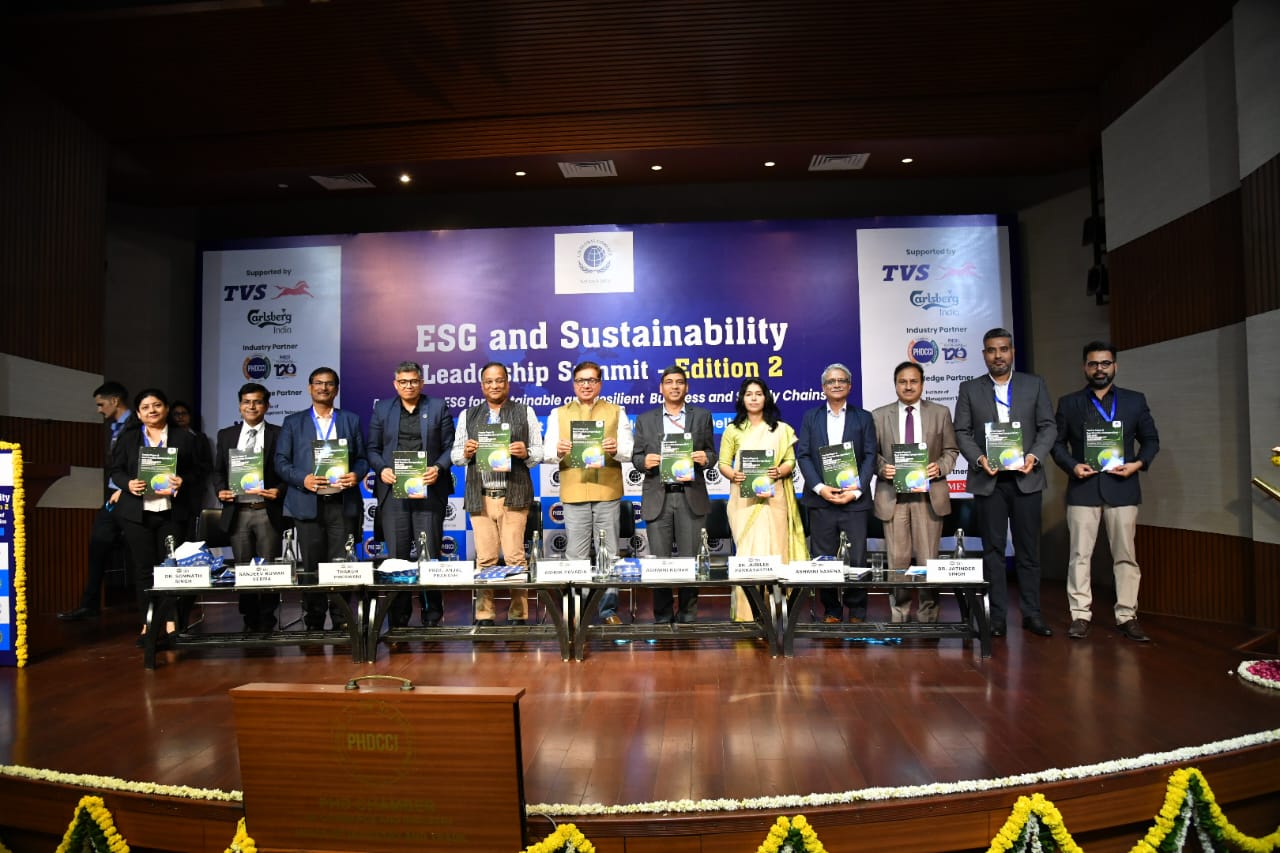
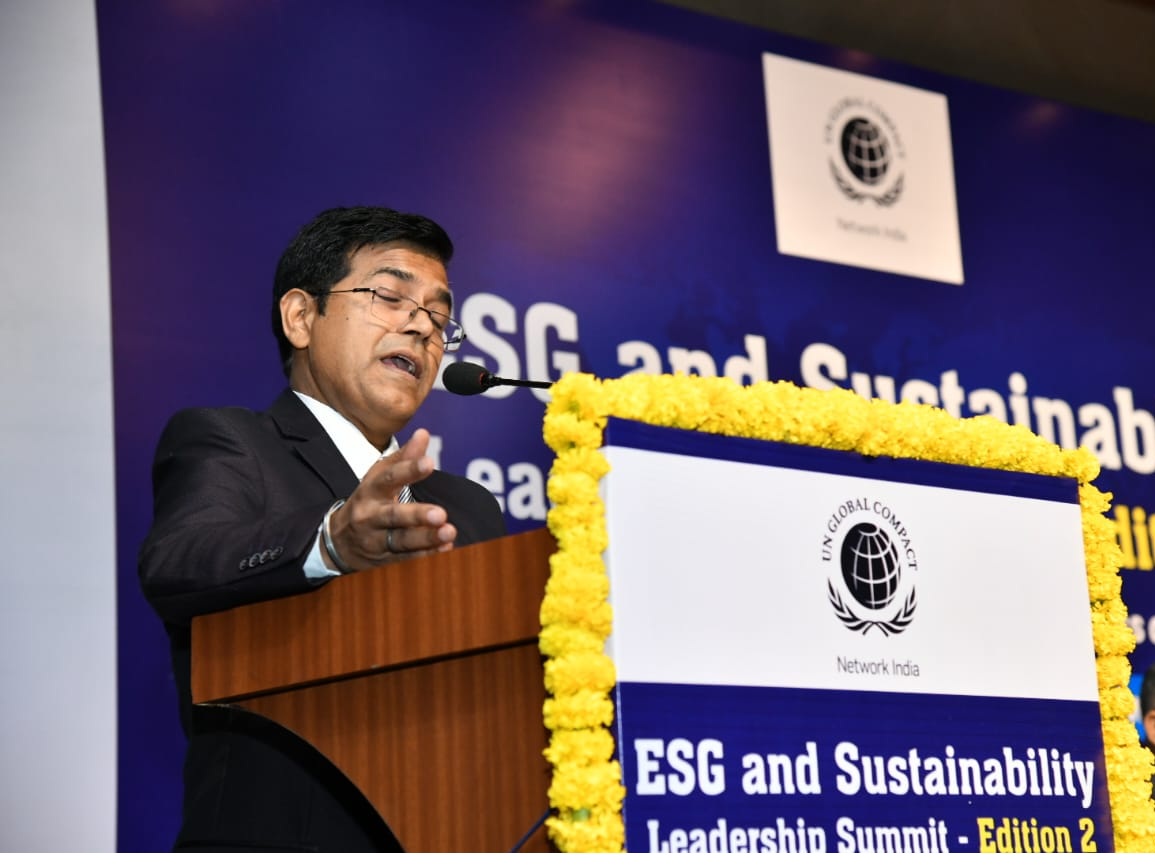
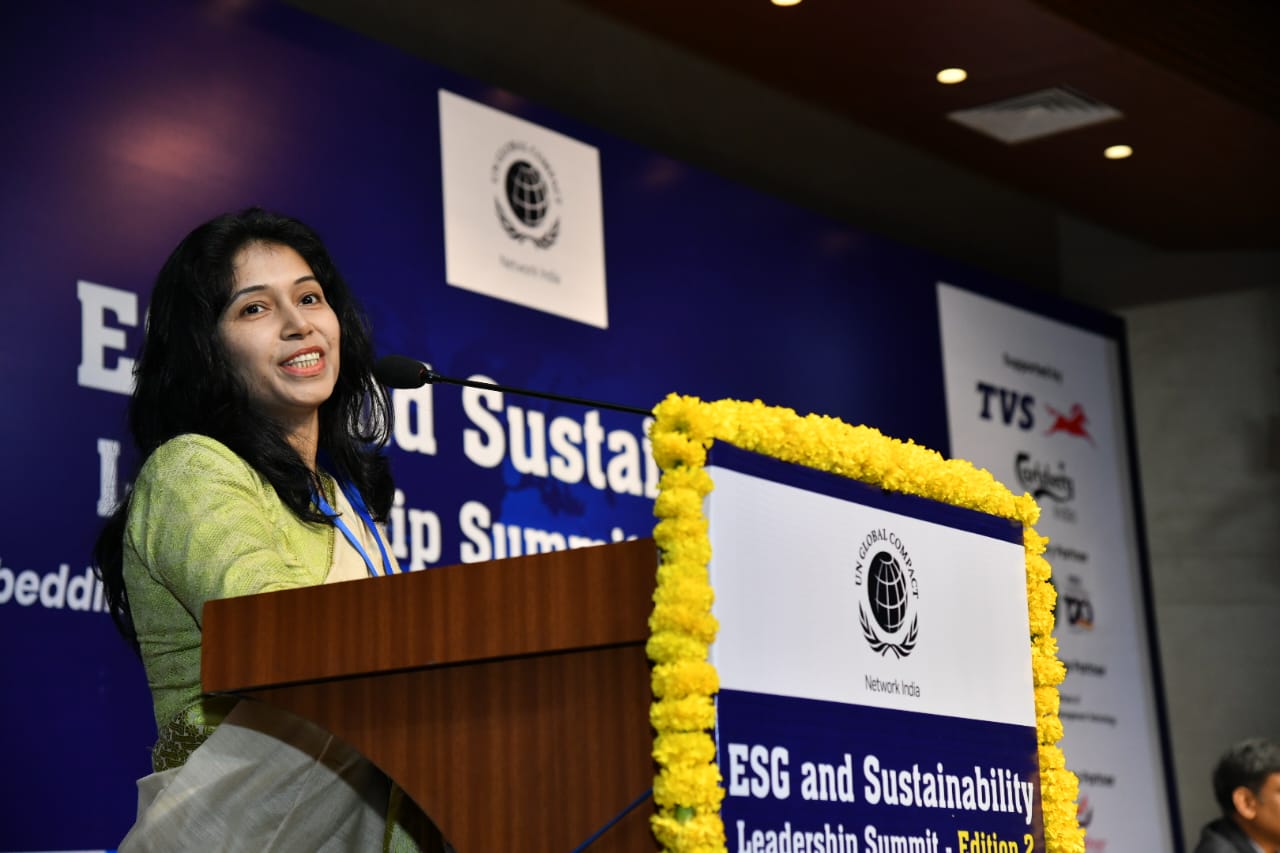
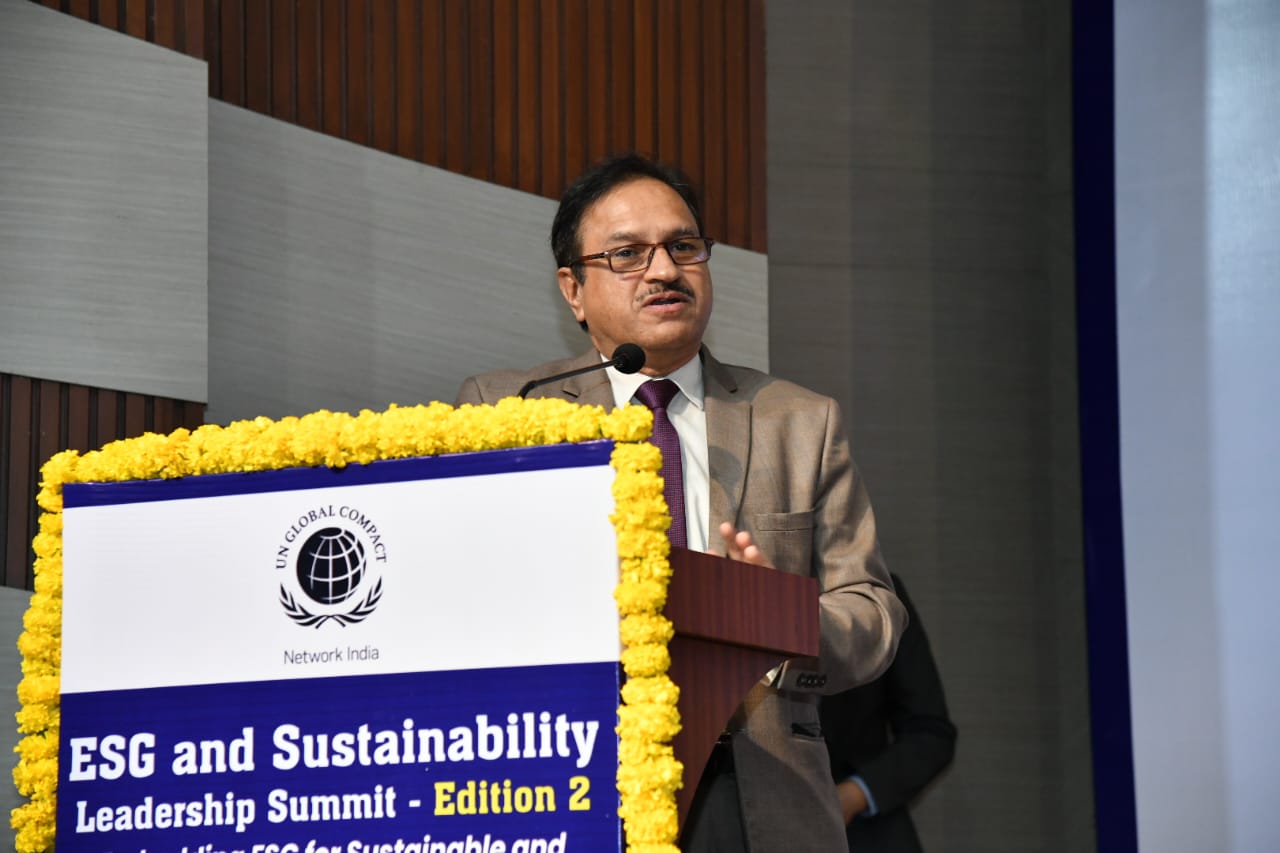
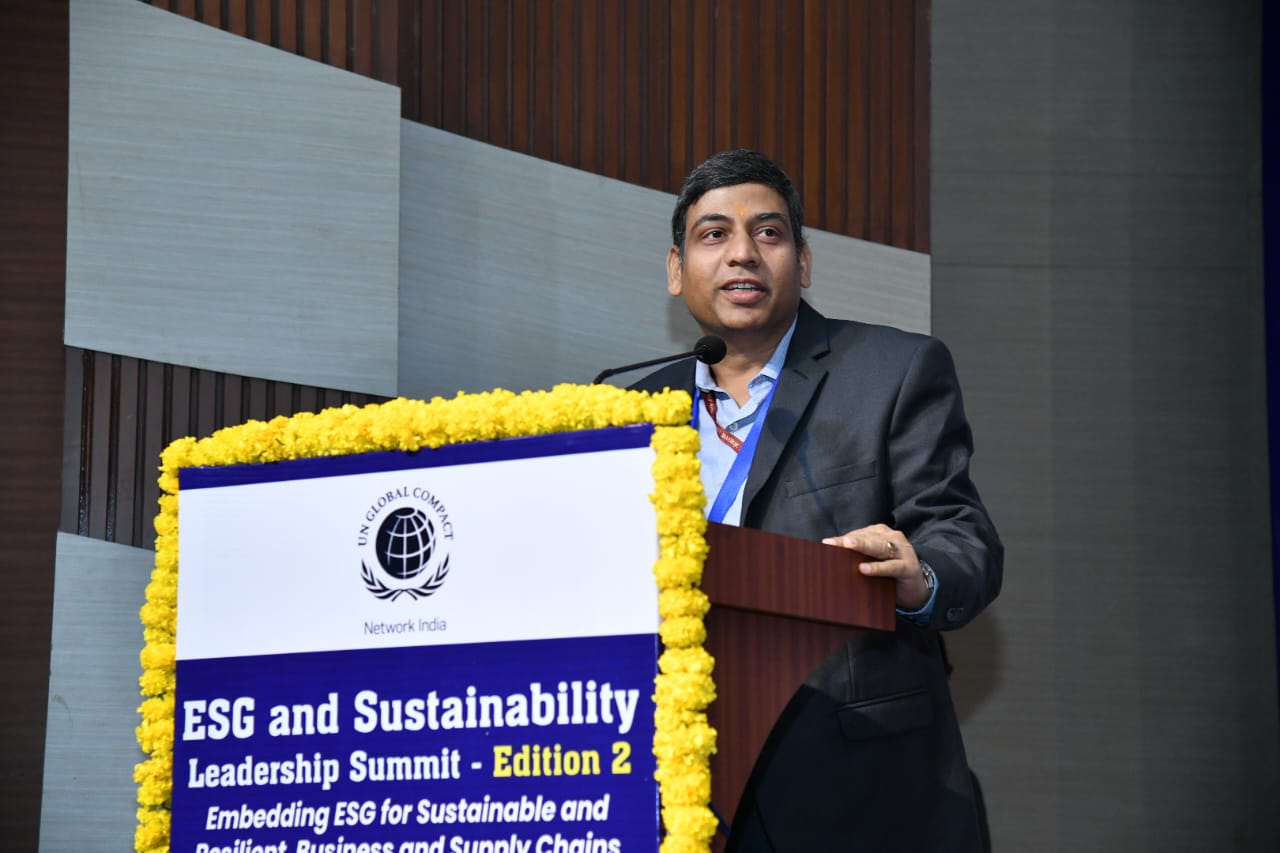
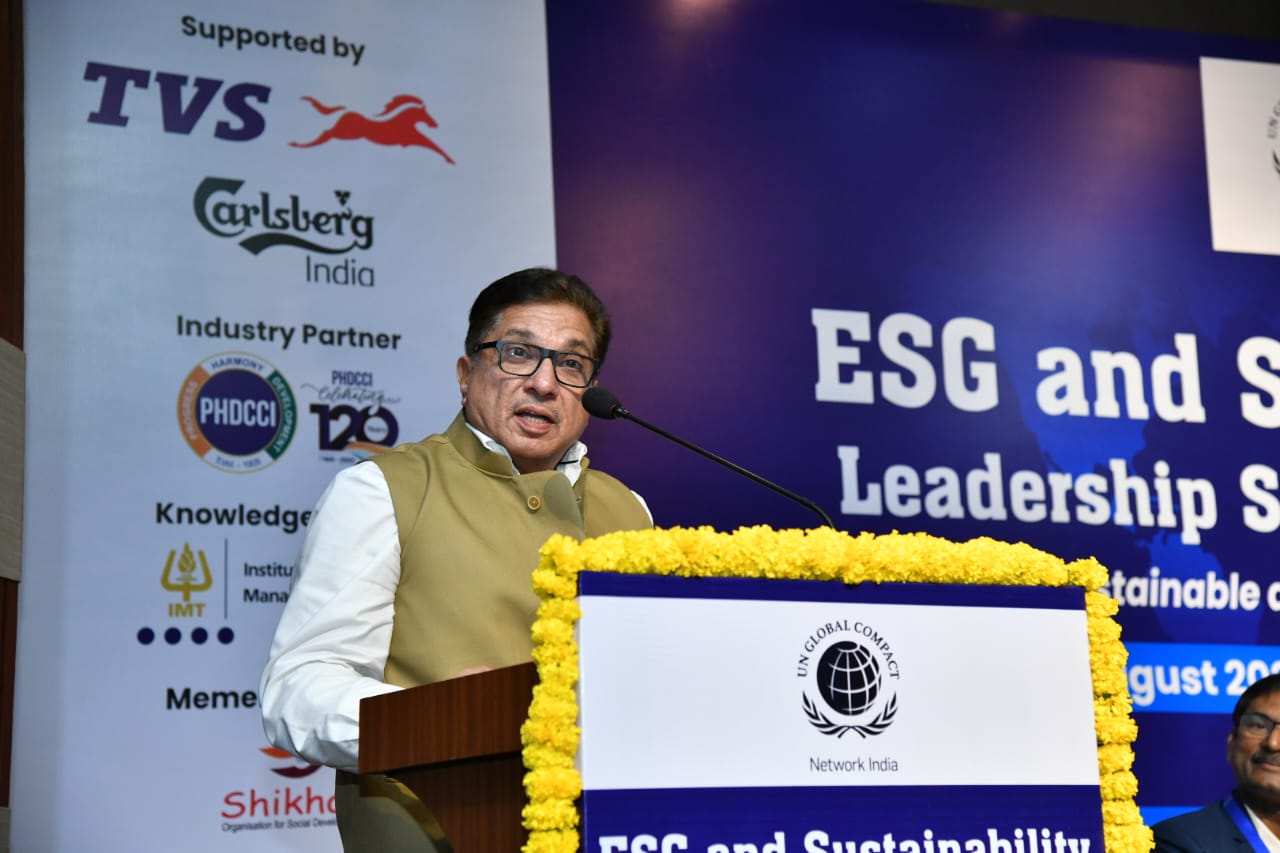
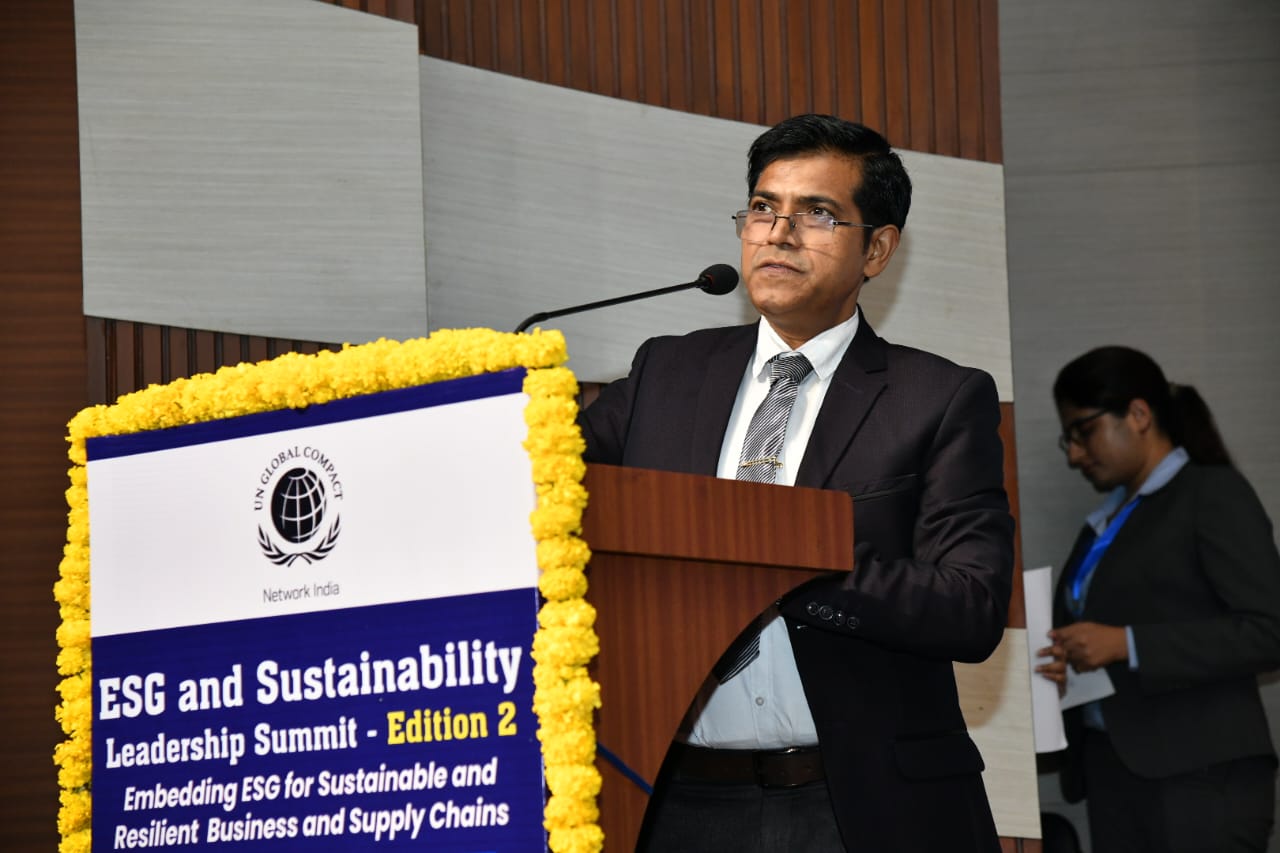
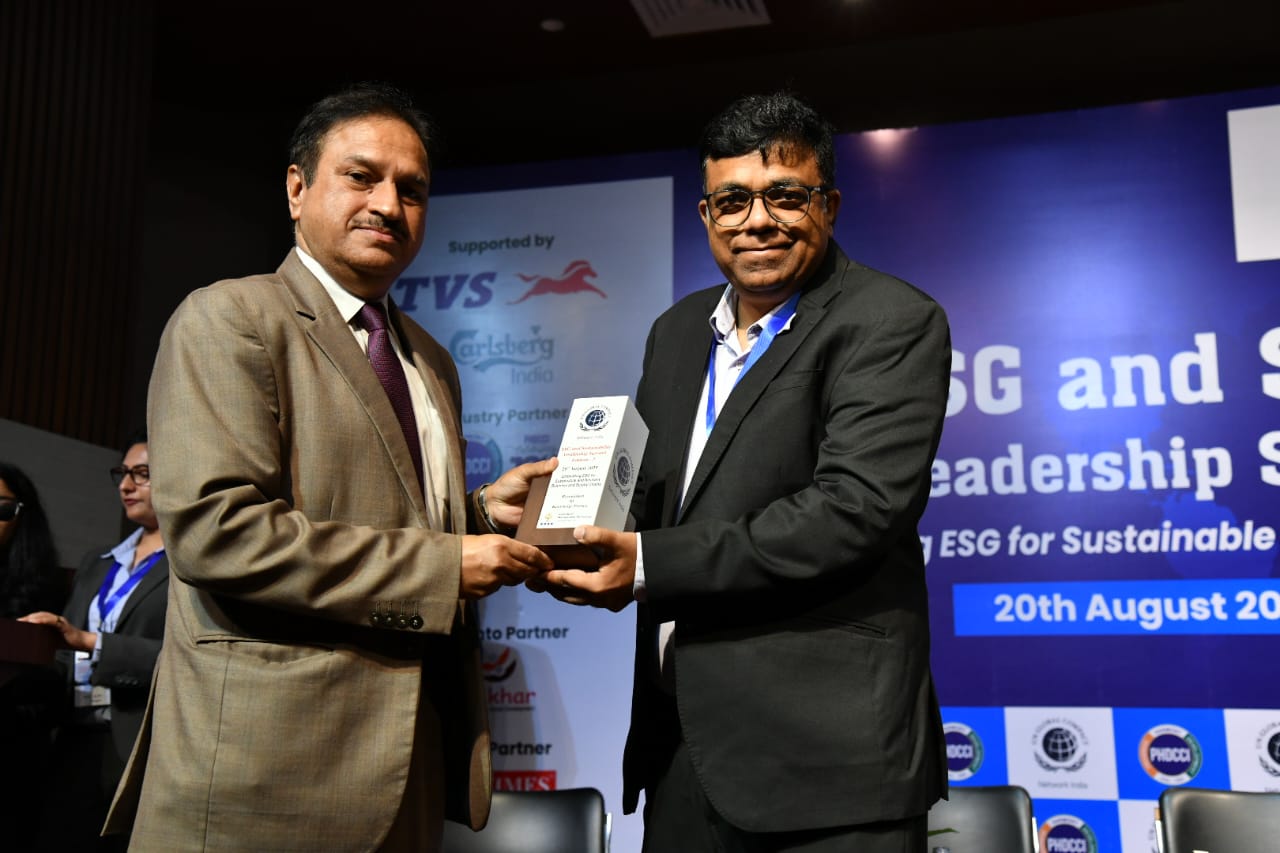
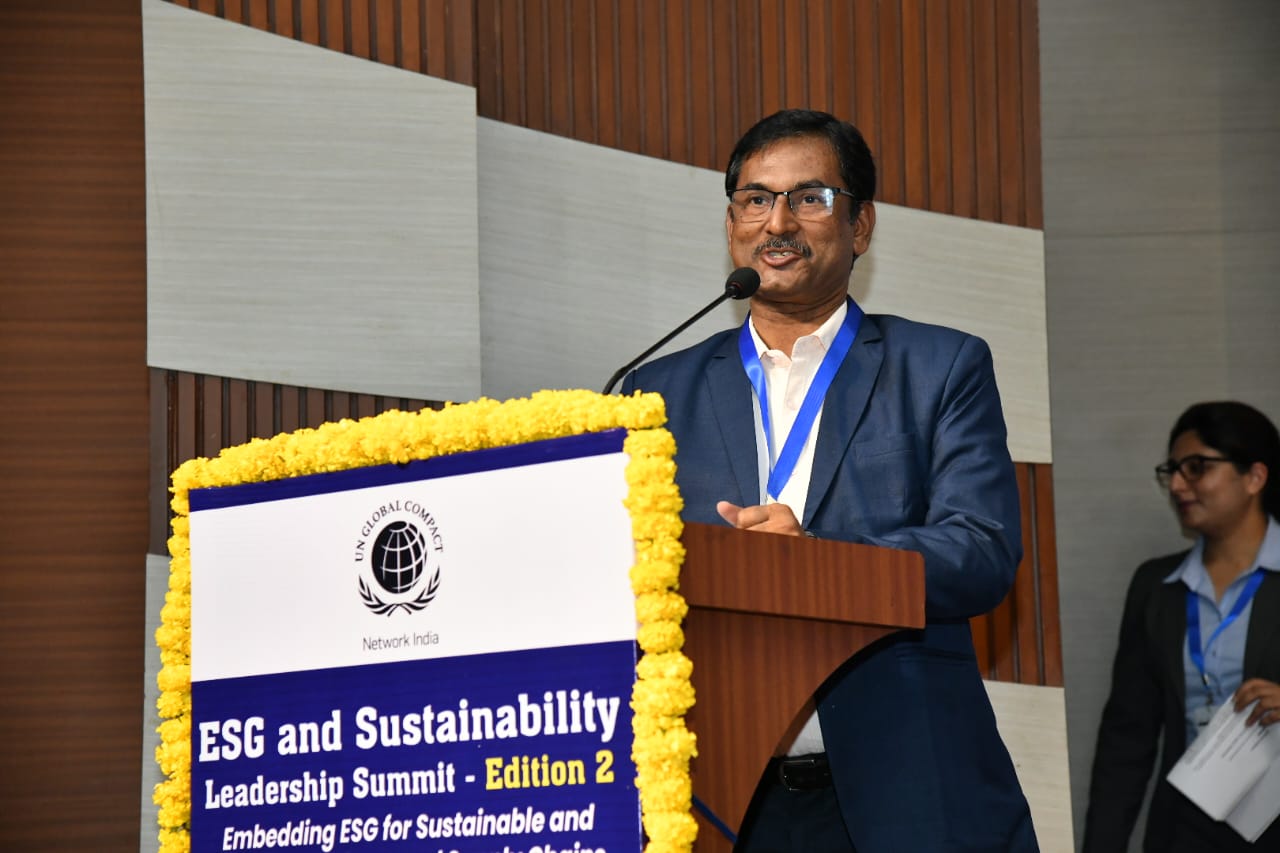
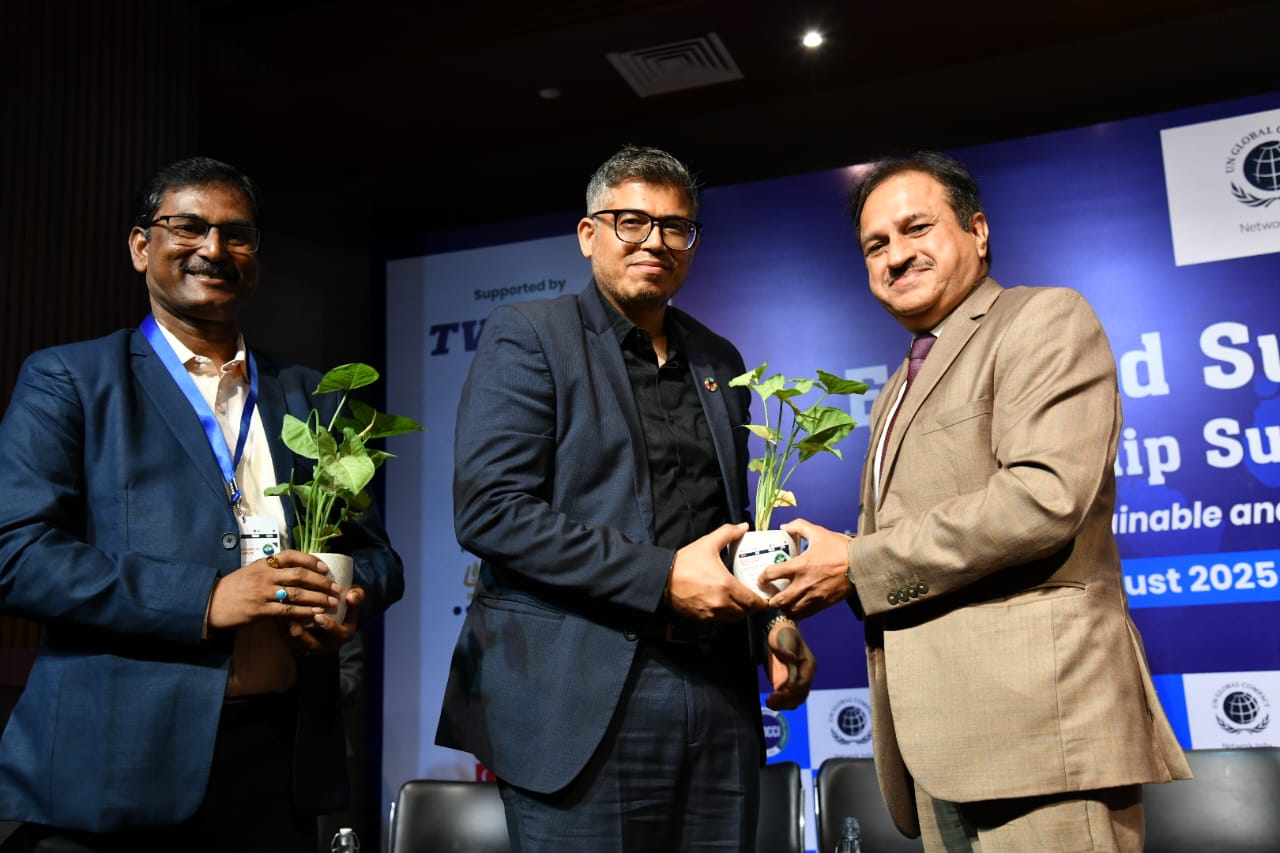
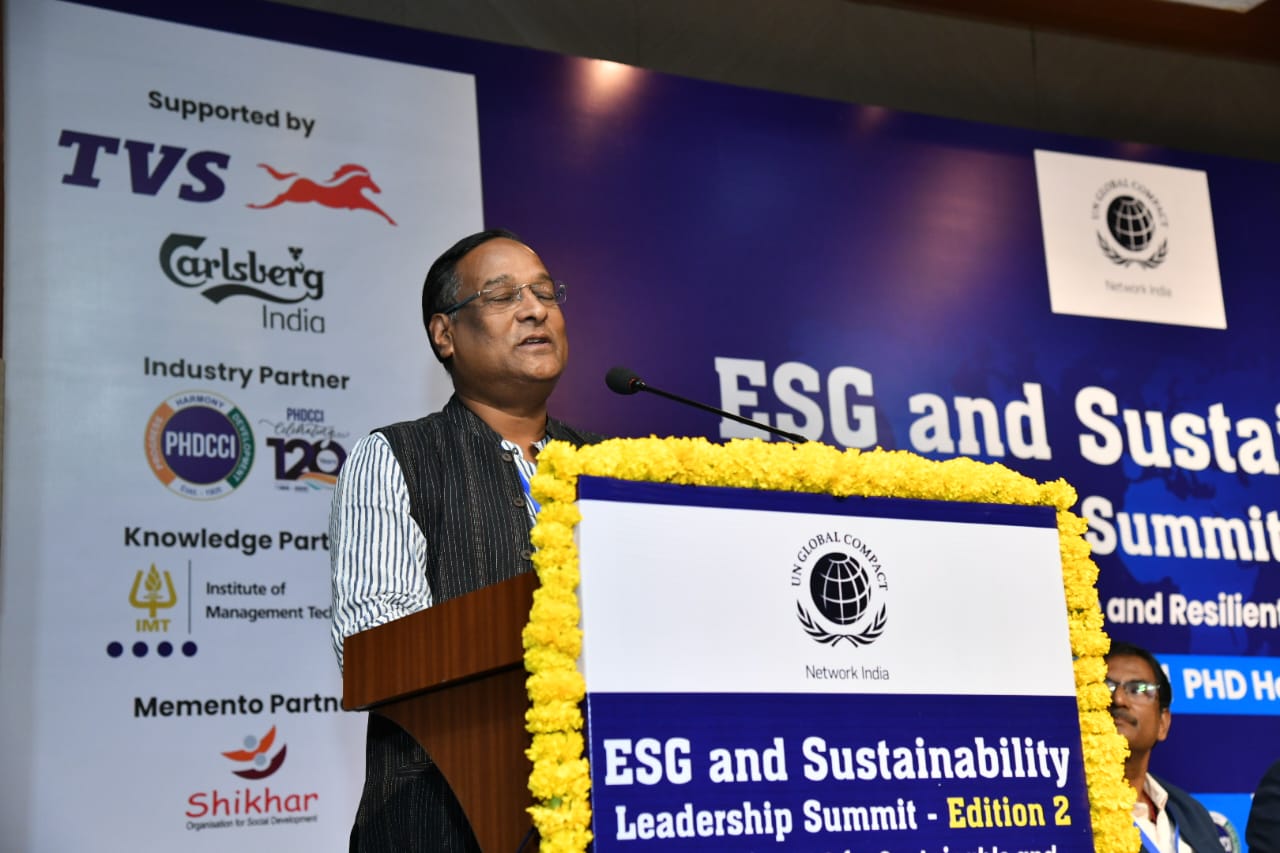
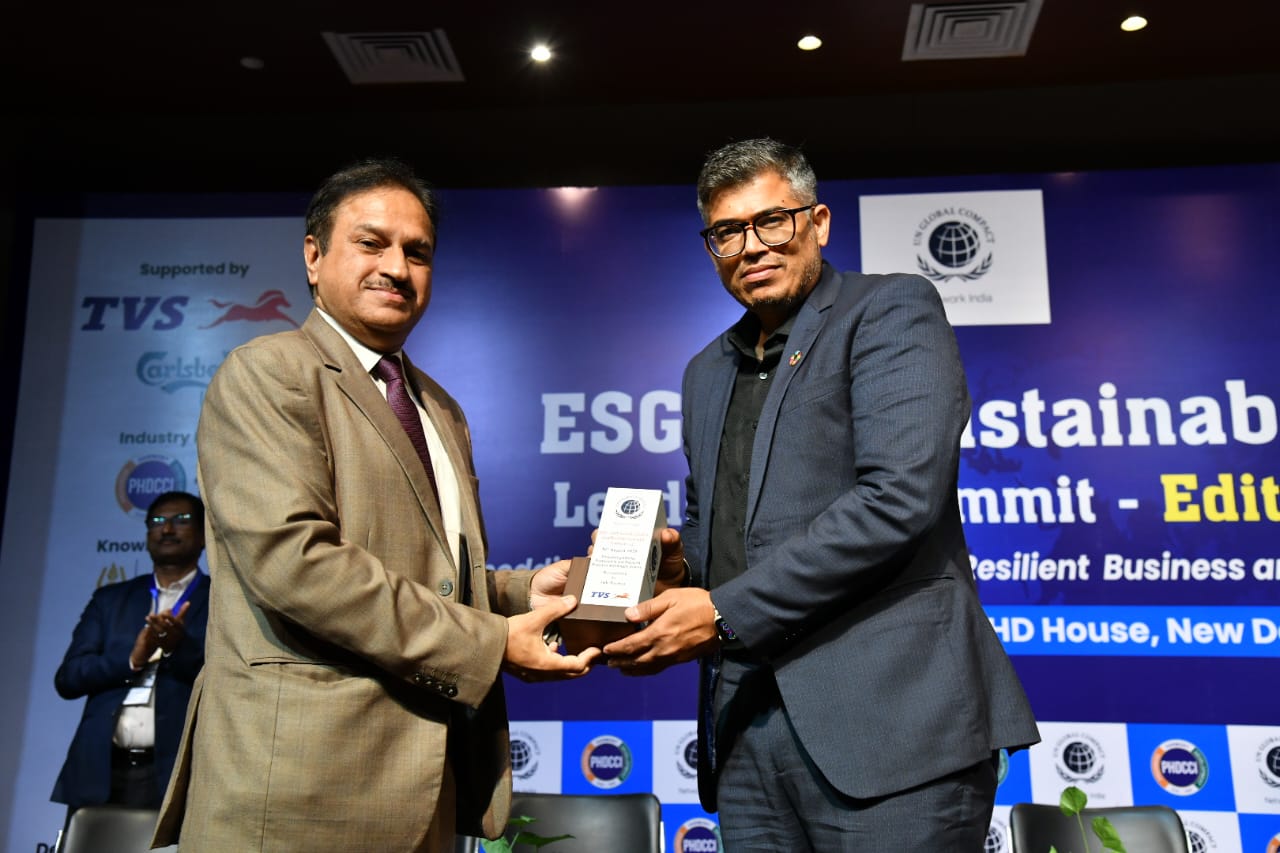
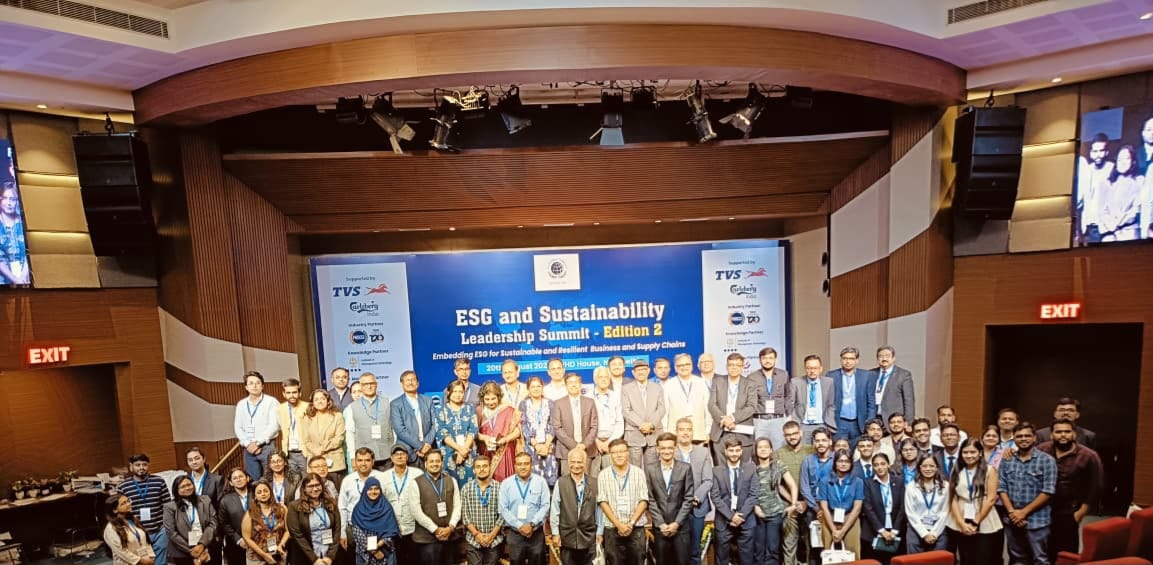
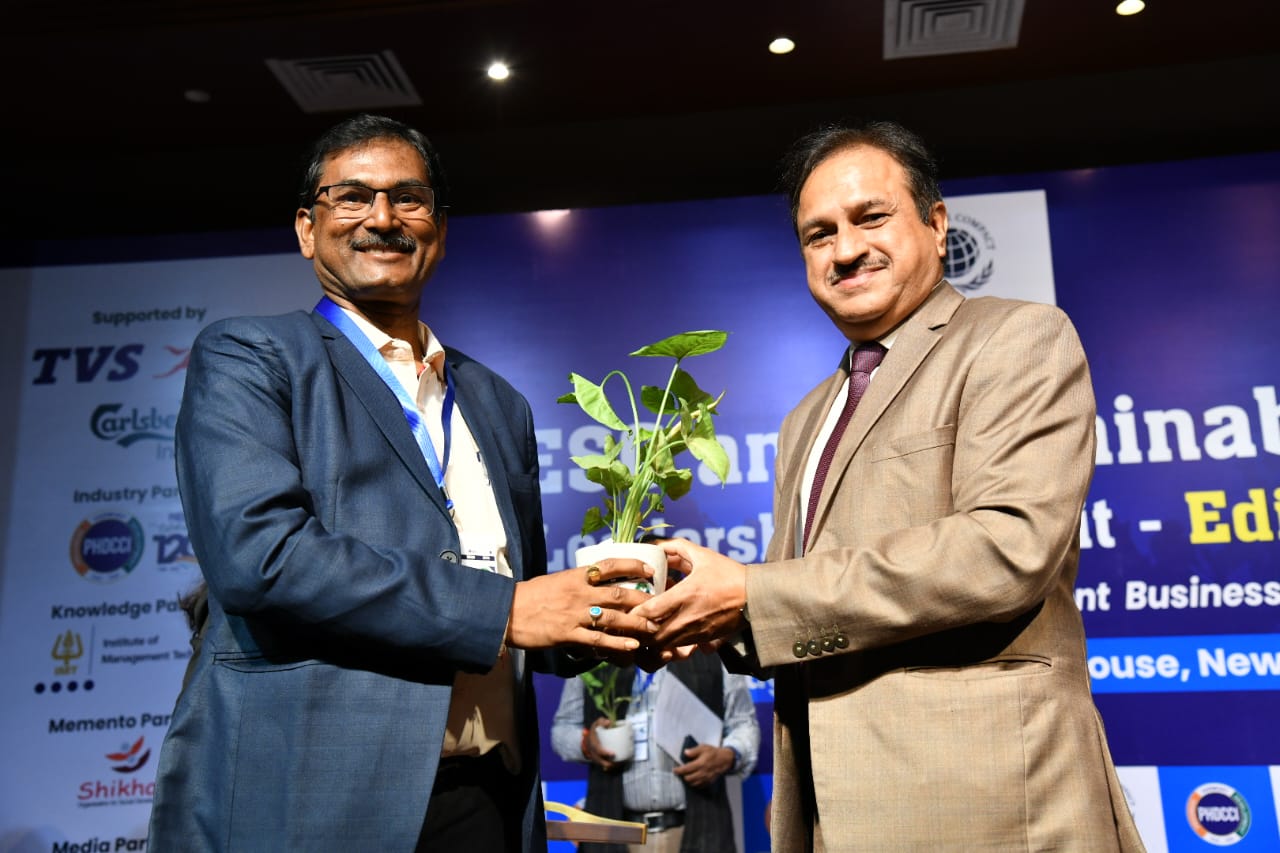
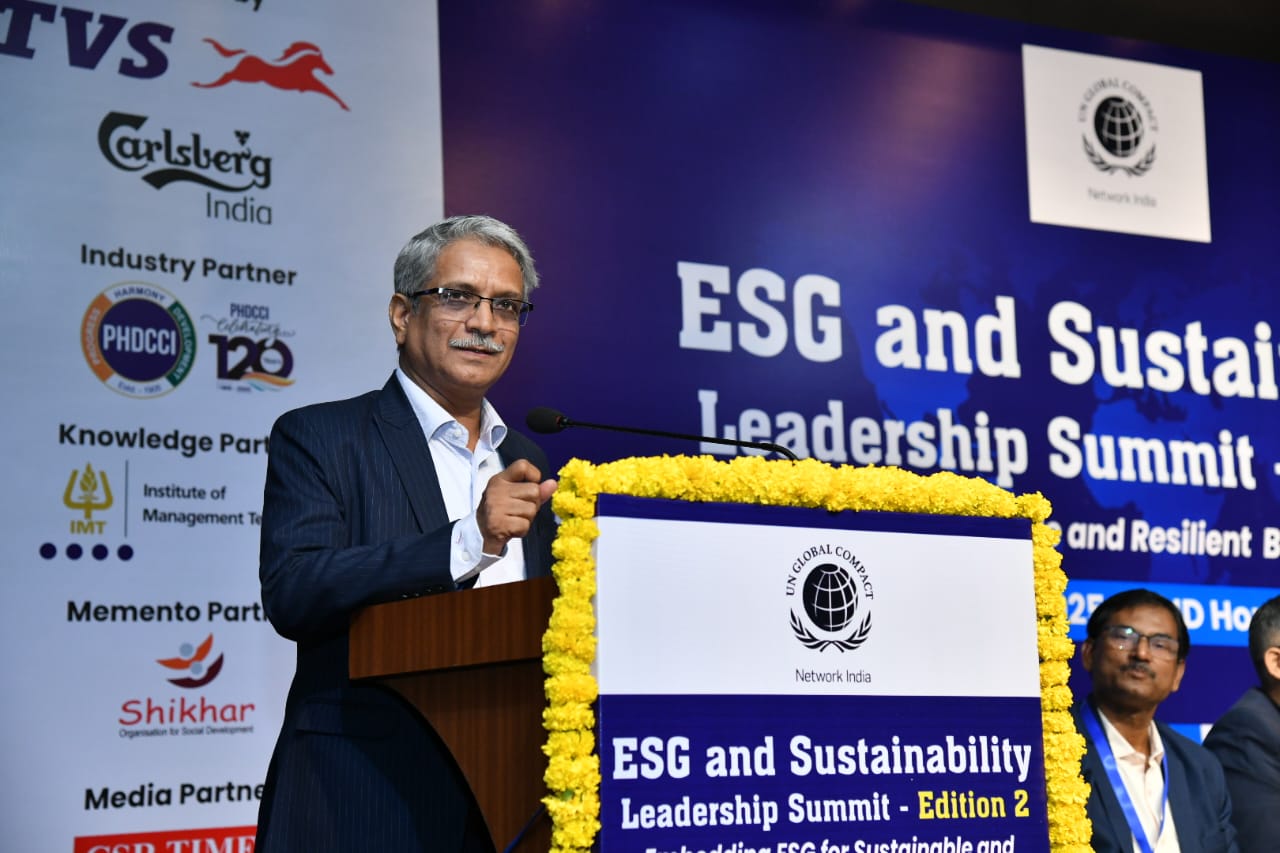
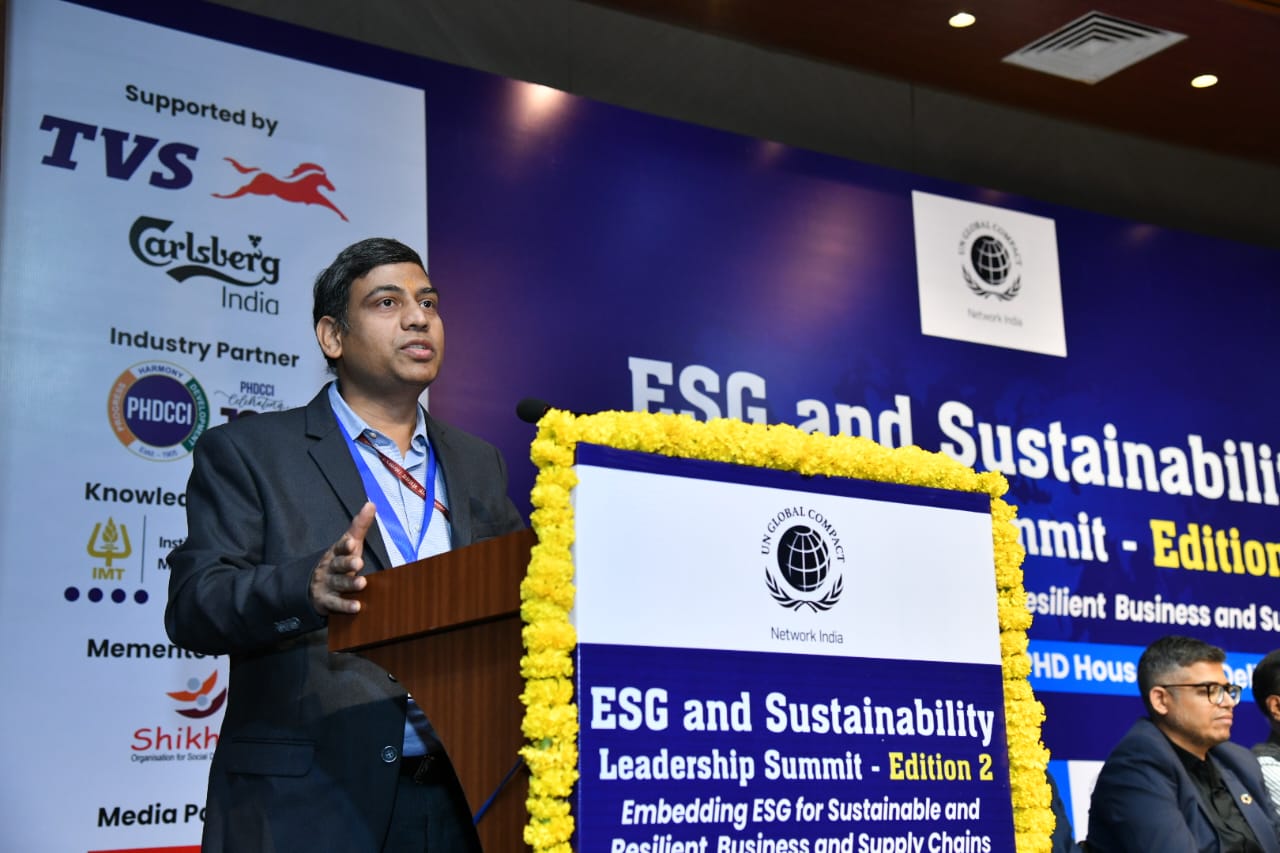
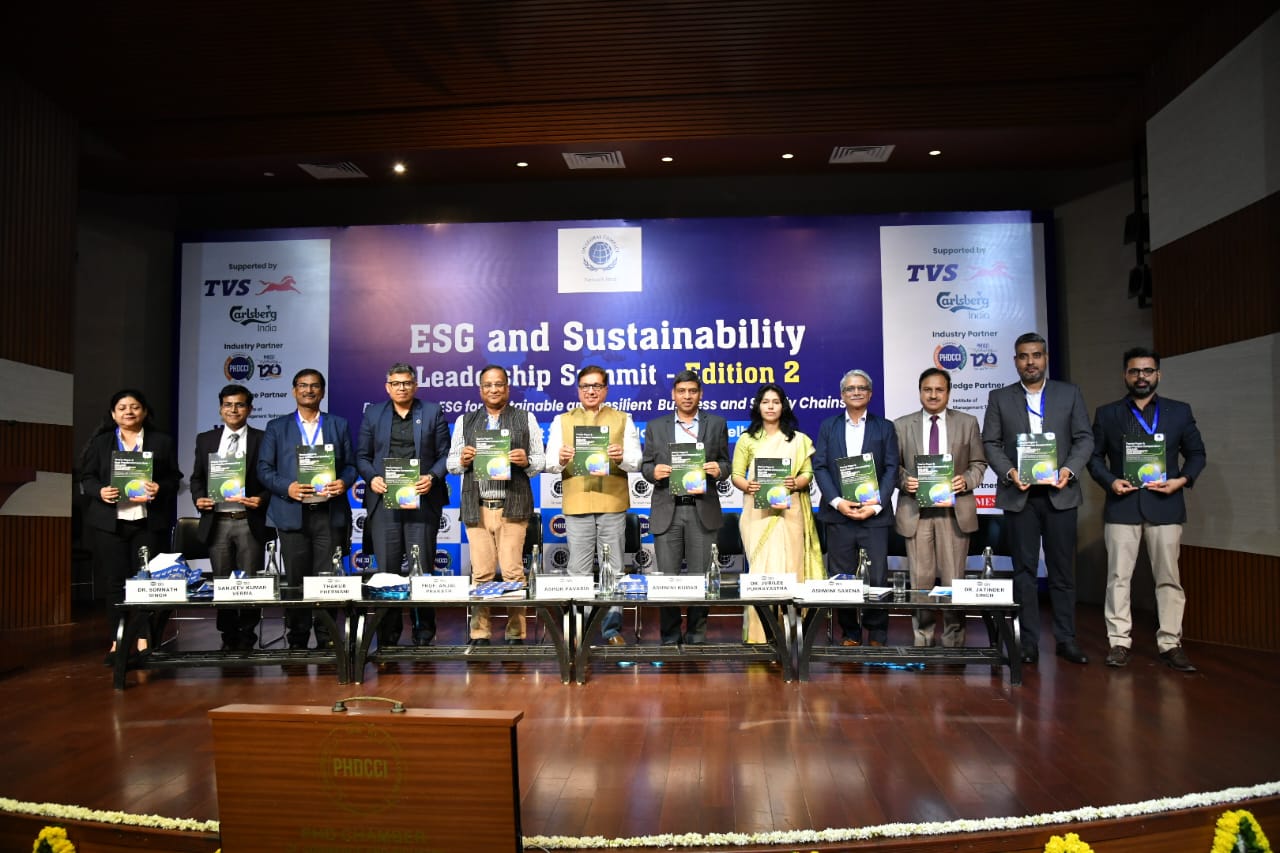
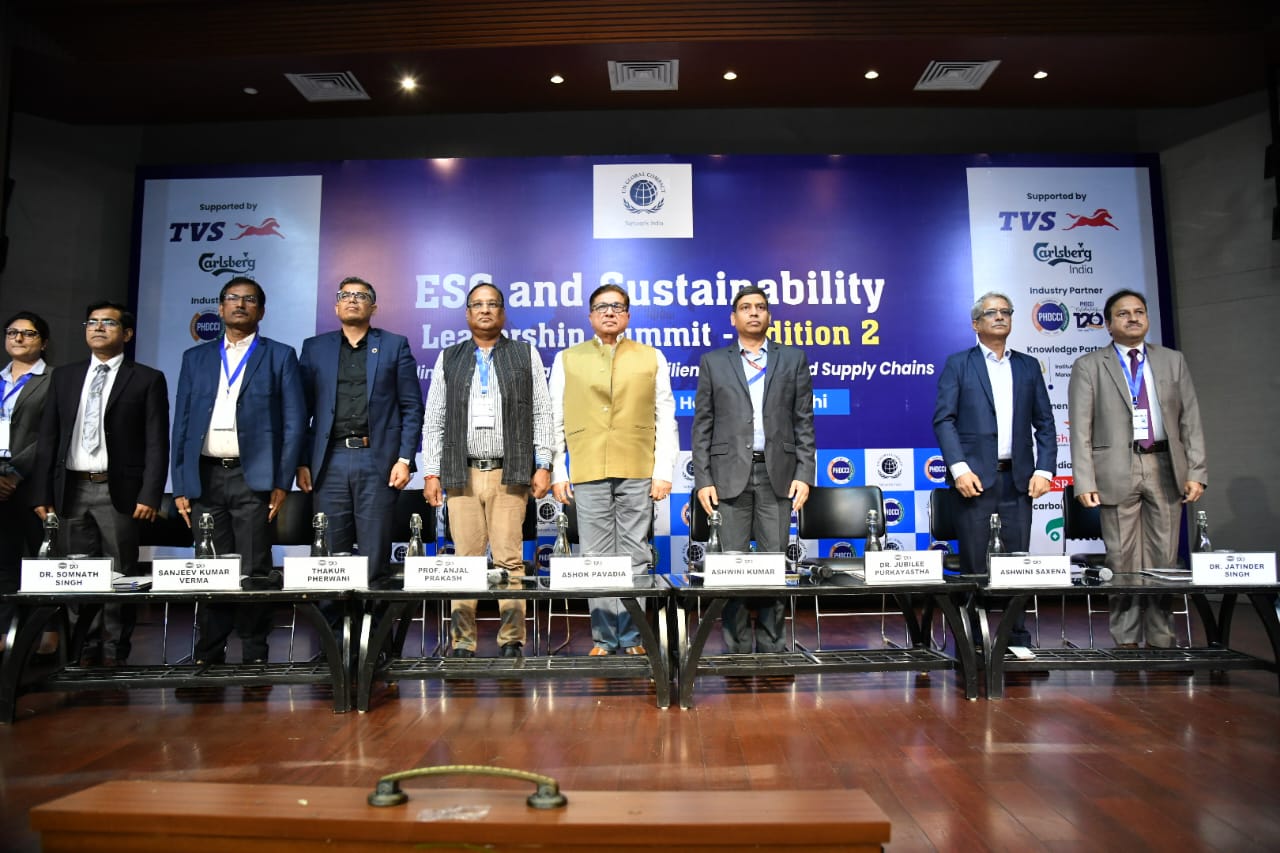
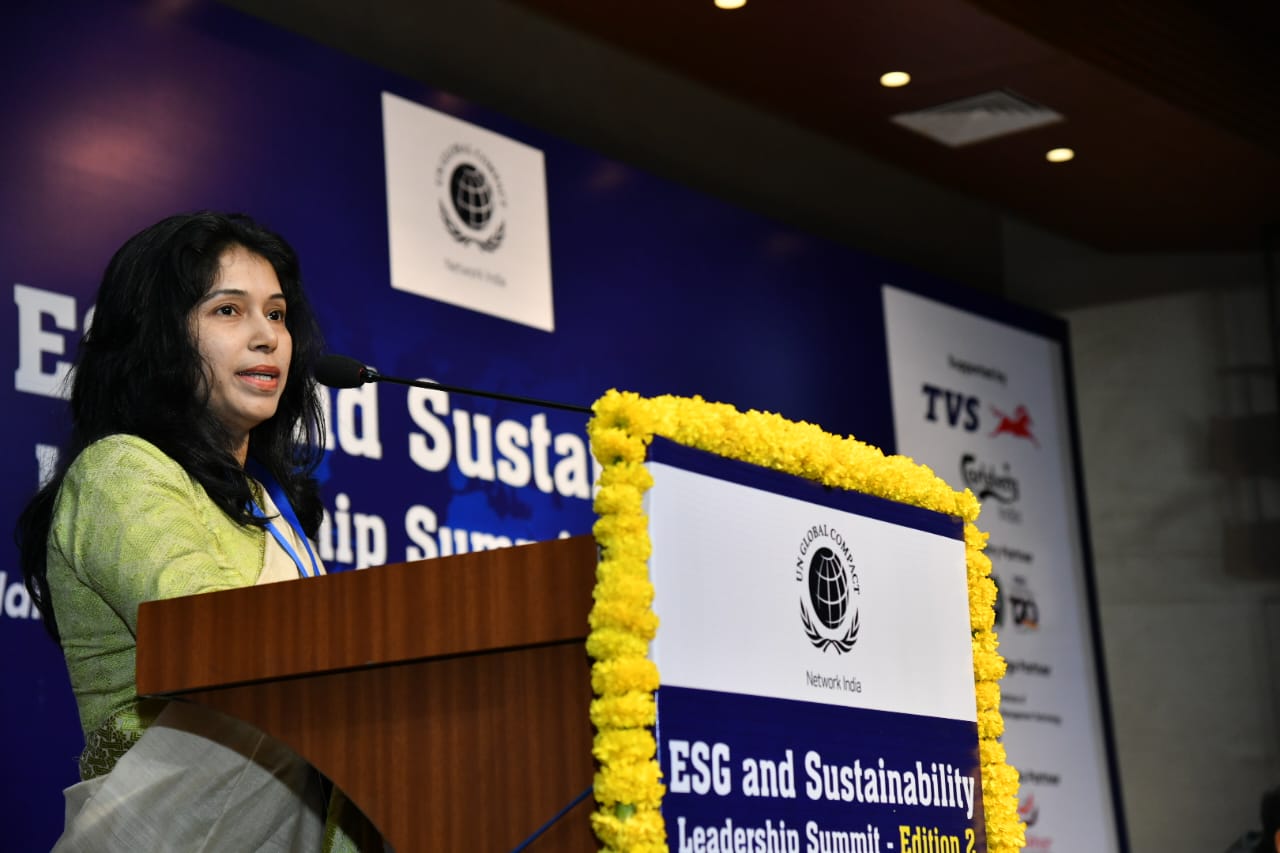
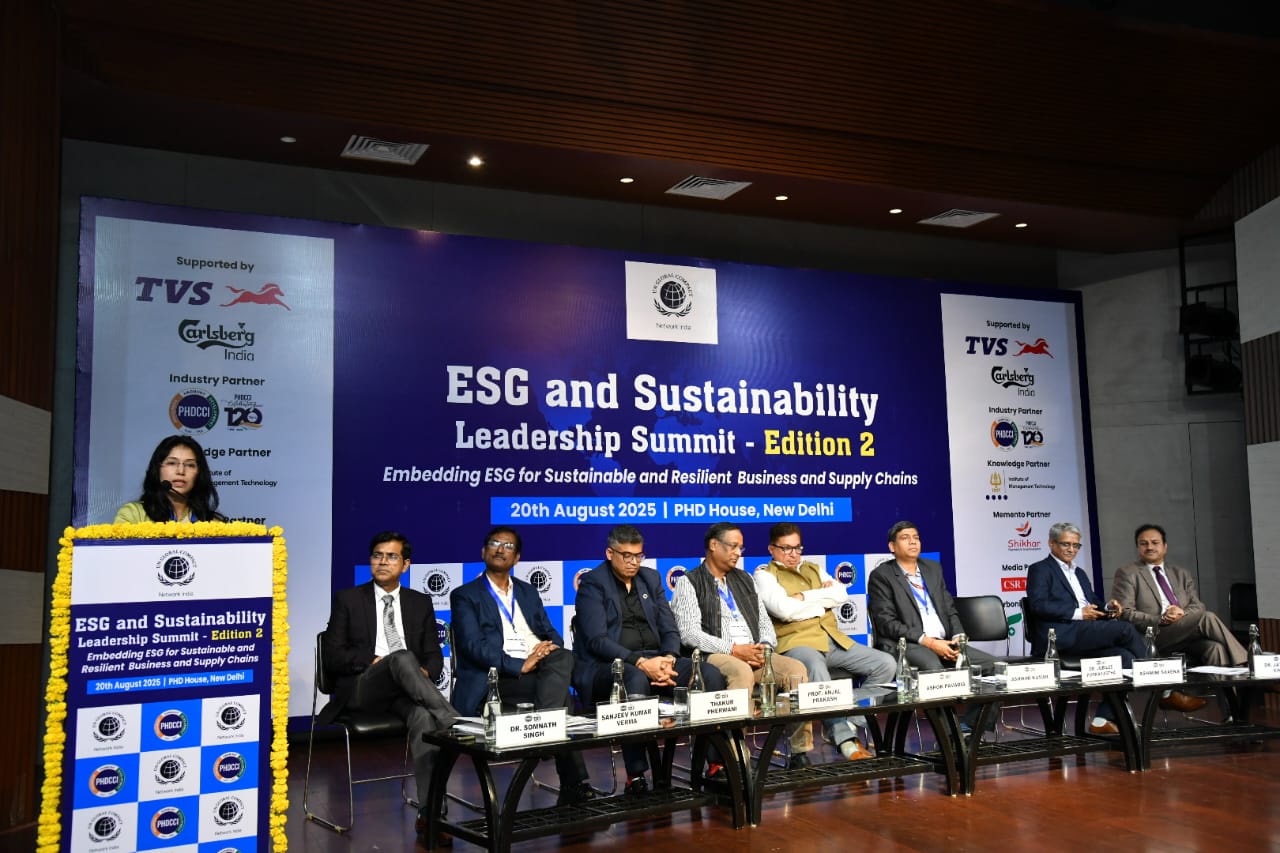
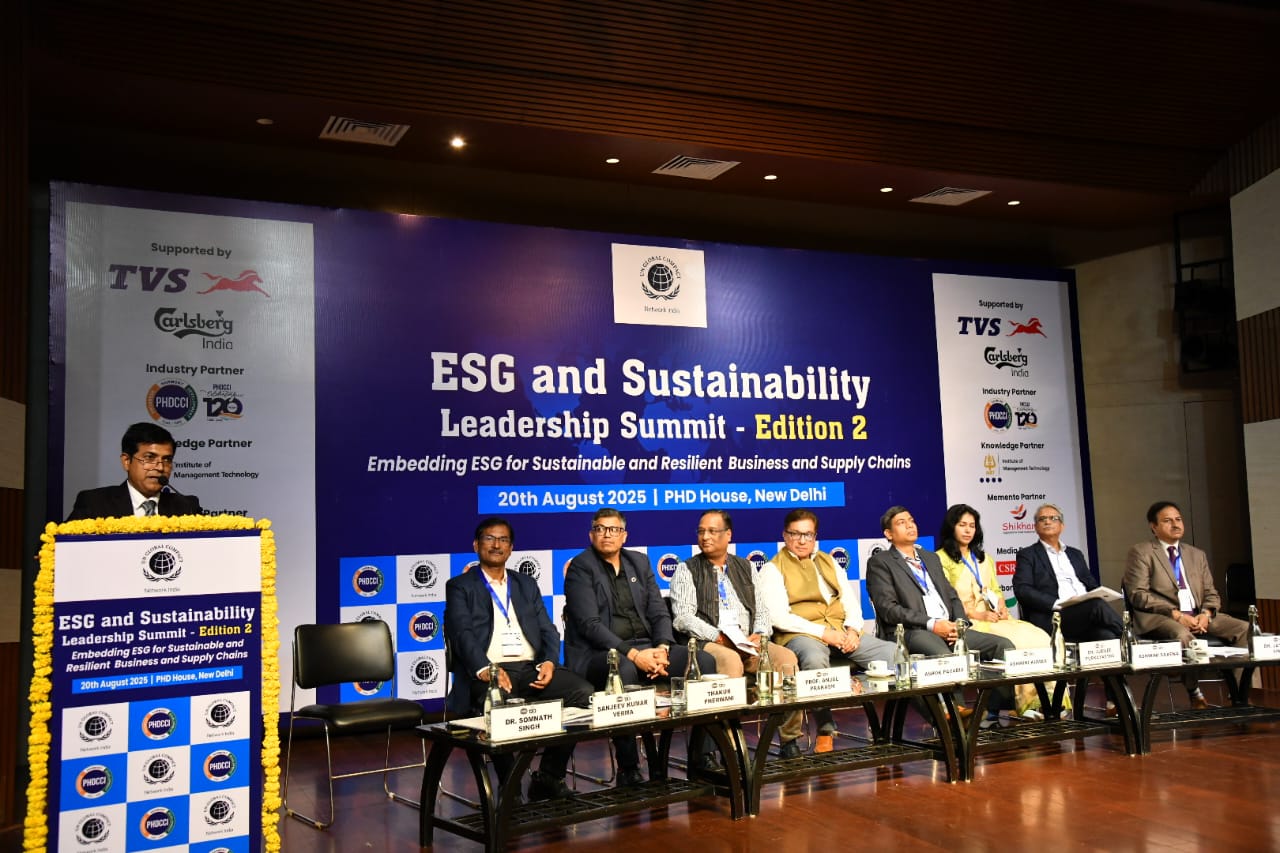
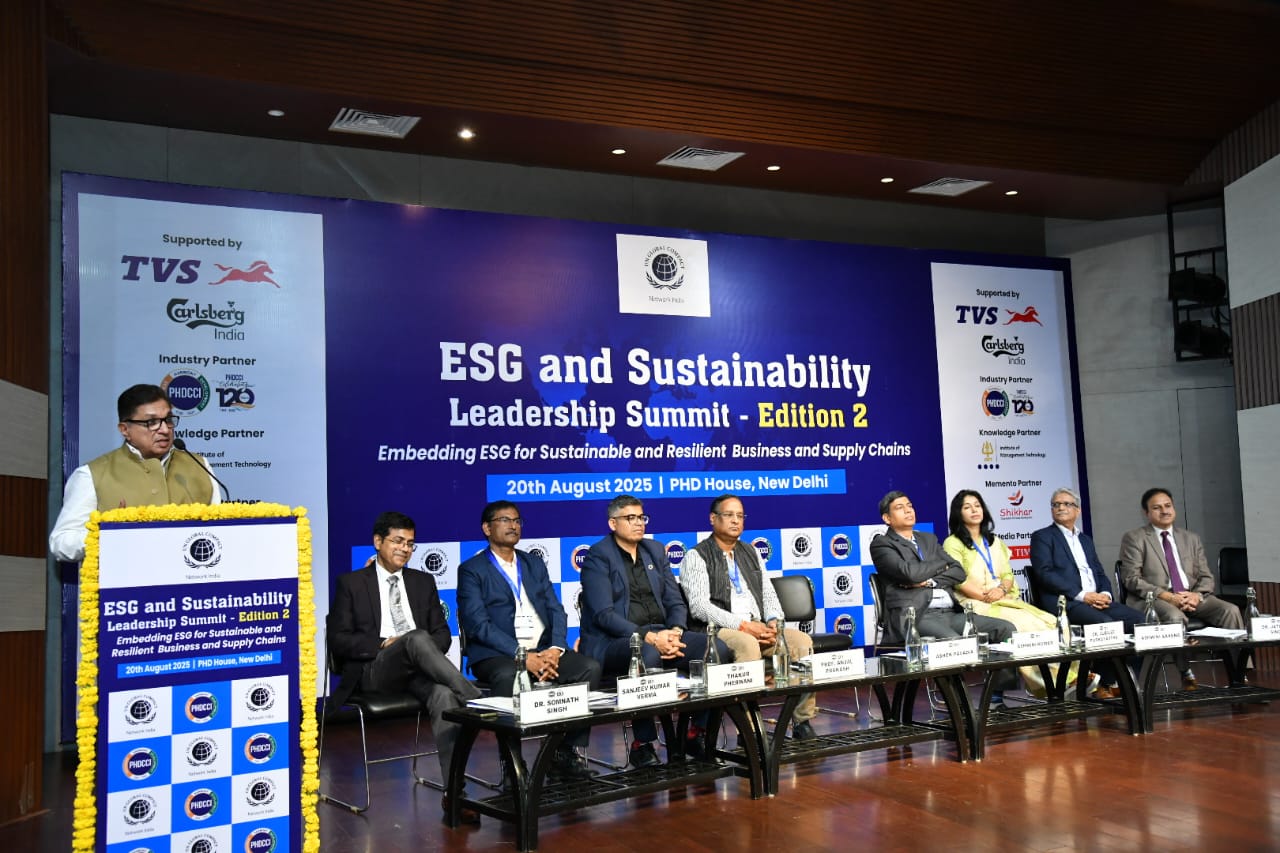
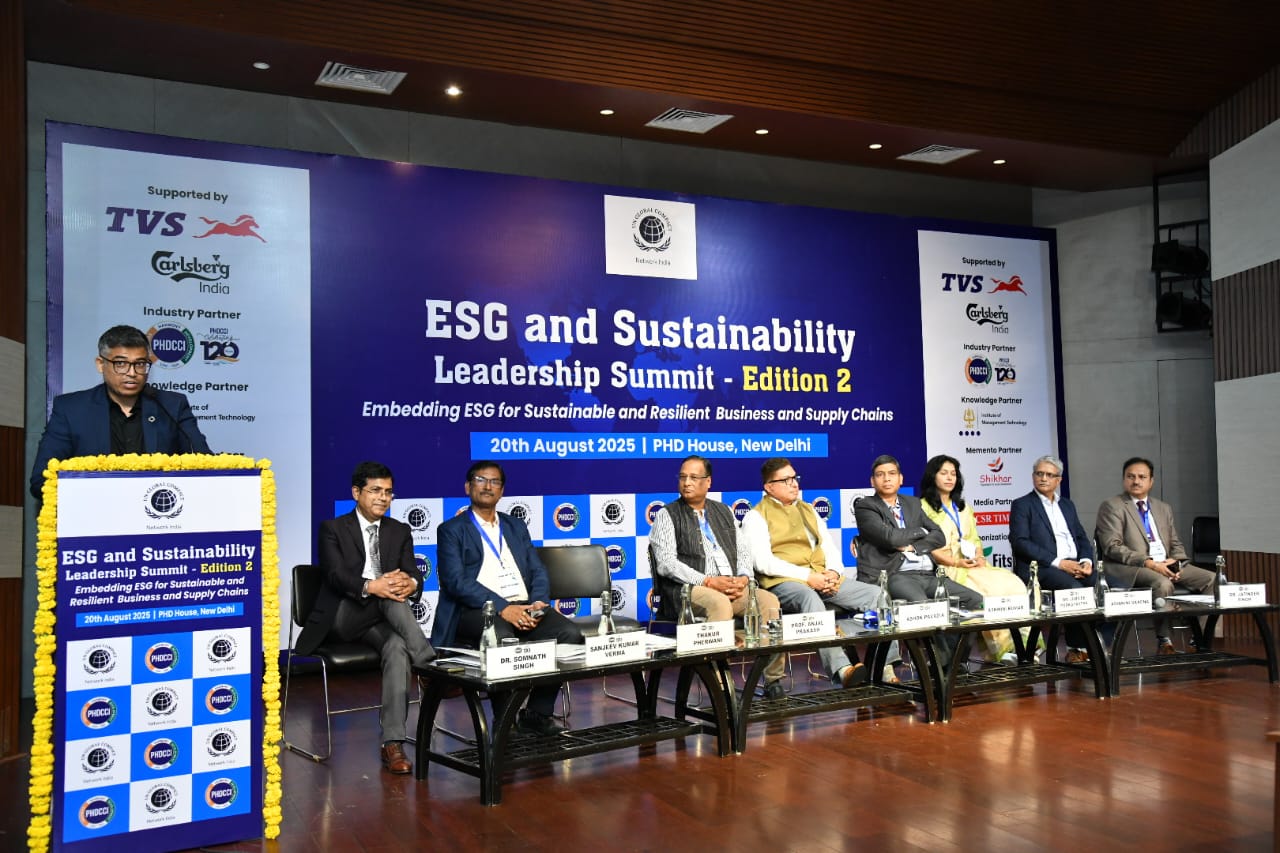
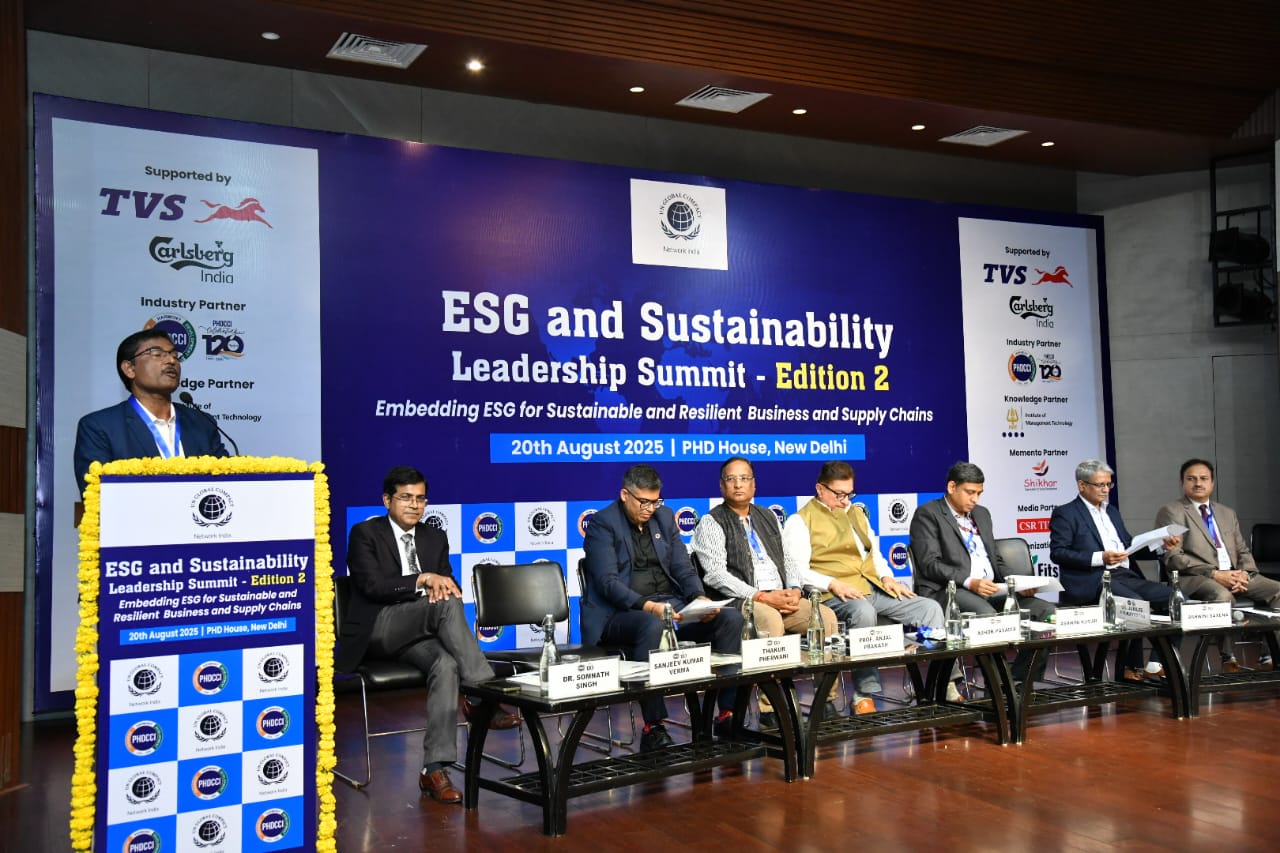
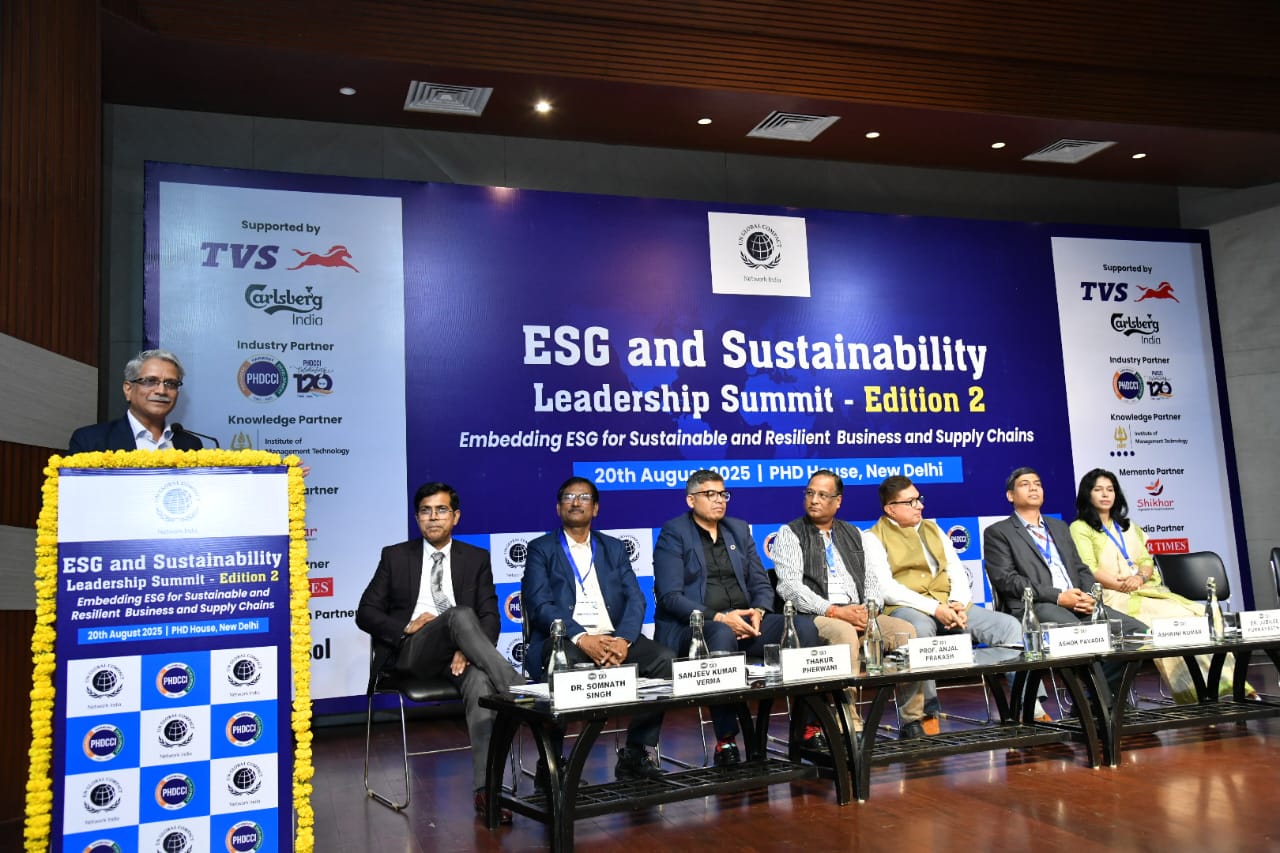
The ESG and Sustainability Leadership Summit: Edition 2, held on August 20, 2025, at PHD House, Delhi, was organized by the UN Global Compact Network India (UN GCNI). The summit was supported by TVS Motors Pvt Ltd as Title Partner. PHD Chamber of Commerce and Industry (PHDCCI) joined as the Industry Partner, while Institute of Management Technology (IMT) contributed as the Knowledge Partner. The event was further enriched through collaborations with Shikhar – Organization for Development as the Memento Partner, CSR Times as the Media Partner, and Fitsol as Decarbonization Partner. Together, these organizations created a dynamic platform for advancing responsible business practices and deepening the integration of ESG into the fabric of corporate India.
The Inaugural session set the direction for the summit by stressing the urgency of embedding ESG into business and supply chains. Speakers highlighted how climate risks, regulatory shifts, technology, and stakeholder expectations were reshaping priorities, making ESG a driver of resilience, competitiveness, and long-term value creation.
Shri Sanjeev Kumar Verma, Vice President, Western Region, UN GCNI & Health-Environmental, Health & Safety, Grasim Industry Limited, delivered the welcome address by extending a warm greeting to the Guest of Honour, Dr. Jubilee Purkayastha, as well as the distinguished dignitaries, eminent speakers, delegates, and participants. He emphasized the privilege of welcoming everyone on behalf of the UN Global Compact Network India to the ESG and Sustainability Leadership Summit 2025 – Edition 2, held under the theme “Embedding ESG for Sustainable and Resilient Business and Supply Chains.”
He highlighted that the summit was taking place at a crucial juncture, where businesses worldwide were facing multifaceted challenges such as climate risks, shifting regulatory frameworks, technological disruptions, and increasing demands from stakeholders for ethical and sustainable conduct. Referring to India’s evolving regulatory landscape, including SEBI’s BRSR Core, alongside global directives like the EU’s CSDDD and CBAM, he underlined that ESG was no longer optional but had become central to competitiveness, resilience, and long-term value creation.
In his remarks, he stressed that the summit aimed to shift ESG from being viewed as a matter of compliance to becoming an intrinsic culture within organizations. With a particular focus on supply chains—where the majority of ESG impacts are often concentrated—he noted the importance of responsible sourcing, climate-smart logistics, digital traceability, and social accountability. He also drew attention to the pivotal role of technology, citing AI, blockchain, and data analytics as tools enabling transparency and impact-driven sustainability.
He further observed that the summit had a strong sectoral lens, particularly on healthcare systems, which had demonstrated during the pandemic the need for resilience, equity, and sustainability as pillars of business continuity and public well-being. In addition, he noted that hard-to-abate sectors like steel, infrastructure, and energy would be key drivers in India’s net-zero transition and global climate leadership.
He reaffirmed India’s growing role in global ESG leadership, noting progress in renewable energy, circular economy initiatives, and sustainability-driven policymaking. He also underlined UN GCNI’s commitment to advancing the UN Global Compact’s Ten Principles and the SDGs, through initiatives in healthcare, anti-corruption, MSMEs, and ESG.
Shri Verma outlined the summit’s objectives, which included clarifying ESG regulations, showcasing the business benefits of ESG adoption, highlighting the role of technology and innovation in accountability, creating sectoral dialogues, and building capacity for the next generation of ESG leaders. He emphasized that the summit’s plenary sessions, ignite talks, and masterclasses would generate actionable insights extending beyond the event itself.
In conclusion, he expressed heartfelt gratitude to the Guest of Honour, Dr. Jubilee Purkayastha, for her scientific and innovation perspectives. He also extended appreciation to the distinguished speakers and participants, acknowledging their role in shaping meaningful discussions and actionable outcomes. He closed his address with the reminder that ESG was not merely a reporting mechanism but a framework for leadership, embedding responsibility, transparency, and resilience into business practices. He welcomed participants once again with the hope that the deliberations would inspire sustainable, equitable, and resilient pathways for the future.
Shri Thakur Pherwani, Chief Sustainability Officer, TVS Motors, delivered the opening remarks, addressing distinguished guests from industry, government, academia, civil society, and the youth. He highlighted the urgent reality of climate and sustainability challenges, pointing out that India experienced over 270 extreme weather events in 2024, while air pollution drains 1.36% of GDP annually and more than 600 million citizens already face high or extreme water stress. He stressed that these are not only environmental concerns but also direct economic and social challenges, further reinforced by global disruptions where climate disasters caused $280 billion in economic losses and supply chain breakdowns cost nearly $2 trillion. At the same time, he observed, the global financial system is signaling change, with $30 trillion in assets now managed under ESG principles, reflecting the fact that sustainability has become central to competitiveness, trust, and long-term value creation.
He contextualized India’s two major national ambitions—Viksit Bharat 2047 and Net Zero by 2070—describing them as inseparable goals. Without environmental security, development remains fragile, and without inclusive growth, the transition to Net Zero would be unjust. He emphasized that achieving both will require embedding ESG principles into strategy, operations, and value chains. He underlined that the gathering was not ceremonial but a working platform to accelerate the shift from compliance to culture, with three key objectives: building leadership capacity, enabling cross-sector collaboration, and shaping actionable agendas that directly advance India’s long-term national goals.
He outlined how India’s enabling policy frameworks are supporting this transition by linking ambition with market opportunity. These include the Indian Taxonomy for sustainable economic activities, the Green Steel Taxonomy to decarbonise a high-emission sector, the India Carbon Credit Trading Scheme with a projected annual market of up to $6 billion by 2030, and the Carbon and Green Credit Frameworks, which can mobilise significant investment into afforestation, biodiversity restoration, renewable energy, and sustainable agriculture. Each of these, he stressed, represents not just regulation but an opportunity for industry to align with national priorities while unlocking new avenues for growth, competitiveness, and resilience.
He highlighted the role of UN Global Compact Network India in mobilising businesses, creating peer-learning platforms, aligning corporate action with the Sustainable Development Goals, and ensuring that deliberations translate into measurable outcomes. The sessions on decarbonising supply chains, digital traceability, just transitions, and ESG integration in healthcare were described as critical building blocks for India’s future. Concluding with a call to action, he quoted Mahatma Gandhi’s words, “The future depends on what you do today,” and urged participants to engage openly, challenge assumptions, form enduring partnerships, and carry forward commitments beyond the summit. He expressed hope that the deliberations would mark the beginning of ambition meeting action, and leadership meeting responsibility.
Dr. Somnath Singh, Deputy Director of UN GCNI, delivered the Summit Overview Address by extending a warm welcome to the Guest of Honour Dr. Jubilee Purkayastha, distinguished dignitaries, eminent speakers, colleagues, and participants. He emphasized that the Summit was not just an event but a platform for dialogue, collaboration, and action at a time when ESG had become a defining framework for business resilience and sustainable growth.
In his remarks, he explained that climate change, regulatory developments, technological disruption, and rising social expectations were reshaping the global business landscape. He underlined that ESG principles—environmental stewardship, social equity, and good governance—were no longer optional but essential for long-term value creation. He noted that India had demonstrated clear momentum through SEBI’s BRSR Core framework, while internationally, initiatives such as the EU’s Corporate Sustainability Due Diligence Directive and the Carbon Border Adjustment Mechanism were creating new imperatives for businesses to embed sustainability across operations and supply chains. He pointed out that the real challenge lay not merely in compliance but in embedding ESG into organizational culture, strategy, and leadership.
Dr. Singh elaborated on the theme, “Embedding ESG for Sustainable and Resilient Business and Supply Chains,” stressing that supply chains were central to ESG impact, encompassing responsible sourcing, ethical labour practices, climate-smart logistics, and transparency. He highlighted the growing role of technology—such as AI and blockchain—in enabling traceability and accountability. Healthcare, one of the focal sectors of the Summit, was cited as a strong example where ESG could advance resilience, equity, and sustainability in a domain critical to human well-being.
He also provided an overview of the structure of the day-long Summit, which brought together leadership perspectives in the Inaugural Session, examined ESG as a lever for resilience through Plenary Sessions, showcased best practices in Ignite Talks, and prepared emerging professionals in the Masterclass on Next-Gen ESG Leaders. He noted that the Valedictory Session would consolidate key insights and launch the ESG Learning Circle to ensure sustained engagement and collaboration beyond the Summit.
In conclusion, Dr. Singh outlined the key objectives of the deliberations: to clarify ESG compliance frameworks, to demonstrate the business case for resilience and competitiveness, to highlight sector-specific strategies for transformation, and to build leadership capacity across industries and among young professionals. He expressed confidence that the discussions would generate actionable recommendations, highlight best practices, and foster partnerships that would contribute to the Summit Insight Report and inform policy advocacy with regulators and ministries. He reiterated that sustainable development could not be achieved in isolation, but required collective responsibility, collaboration, and trust. He thanked the Chief Guest, Guest of Honour, all speakers, and participants for their valuable presence and commitment, and closed his address by inviting all participants to actively engage and contribute to the collective mission of embedding ESG at the core of business and society.
Prof. Anjal Prakash, Academic and expert in water resources, climate change, and environmental policy at the Indian School of Business, Hyderabad, delivered the Theme Address. He began by emphasizing that the Summit’s theme, “Embedding ESG for Sustainable and Resilient Business and Supply Chains,” was both timely and critical. He reflected on the urgency of the present moment, noting that climate change was no longer a distant challenge but a lived reality, evident in rising heatwaves, floods, air pollution, and biodiversity loss. These disruptions, he stressed, were already affecting lives, livelihoods, and economies. At the same time, the global economy was undergoing a profound shift, with investors, regulators, and consumers increasingly demanding accountability, transparency, and sustainability from businesses. Against this backdrop, ESG had emerged as a guiding framework to align business practices with planetary limits and societal expectations. For India, he noted, the stakes were particularly high, given its dual challenge of sustaining growth for 1.4 billion people while addressing deep-rooted social and environmental concerns.
He underlined that the focus on business and supply chains was of special significance, since supply chains were often where the most pressing ESG impacts occurred. These included emissions, resource use, labour practices, and impacts on communities. Embedding ESG in supply chains, he explained, required responsible sourcing, the use of digital traceability and data-driven monitoring, climate-conscious logistics and energy transitions, and greater equity and inclusion for workers and local communities. He emphasized that this was not merely a moral responsibility but a strategic imperative, as companies that successfully integrated ESG principles would emerge stronger, more competitive, and more trusted in the years to come.
Prof. Prakash further observed that technology and innovation would be decisive enablers of this transformation. Artificial intelligence, blockchain, and advanced analytics could enhance monitoring, measurement, and reporting of ESG performance, thereby reducing the risk of greenwashing and ensuring credibility. At the same time, innovations in climate technologies, renewable energy, circular economy models, and sustainable finance were creating new opportunities for businesses to thrive while simultaneously reducing their environmental and social footprint.
He expressed particular appreciation for the Summit’s focus on healthcare, noting that the pandemic had underscored the critical role of resilient, equitable, and sustainable healthcare systems. He argued that healthcare was not only central to human well-being but also to business continuity and economic stability. He also highlighted the importance of hard-to-abate sectors such as steel, infrastructure, and heavy industry, stressing that their transition to ESG-compliant models was essential if India was to meet its Net Zero commitment by 2070 and strengthen its role in global climate leadership.
In his address, Prof. Prakash pointed out that India had already demonstrated leadership in embedding sustainability through policy initiatives such as renewable energy expansion and circular economy practices. With the growing emphasis on ESG regulations, he suggested that India had a unique opportunity to shape a developmental model that was not only high-growth but also just, inclusive, and sustainable. However, he cautioned that this could not be achieved in isolation. It required collective effort, with partnerships across industry, academia, government, and civil society.
Concluding his remarks, he stressed that ESG should not be reduced to a compliance exercise or a box-ticking requirement. Instead, it needed to become a culture of leadership and accountability, reimagining businesses as agents of positive change—balancing profitability with responsibility towards the planet and people. He underlined that the true competitiveness of the future lay in responsible business practices, as organizations that embedded ESG would not only withstand disruptions but also lead in creating long-term sustainable and inclusive value.
Shri Ashwini Saxena, CEO, GMR Varalakshmi Foundation, delivered the special address. He began by acknowledging the presence of the Guest of Honour Dr. Jubilee Purkayastha, distinguished dignitaries, industry leaders, fellow speakers, and participants, and expressed that it was an honour to share his thoughts on the integration of ESG in infrastructure, aviation, and the steel industry, which he described as the backbone of India’s growth.
He highlighted that steel was fundamental to infrastructure, construction, mobility, energy, and defence, and as India aspired to become a USD 5 trillion economy, demand for steel would continue to rise. At the same time, he cautioned that steel was among the most carbon-intensive sectors, contributing nearly eight percent of global emissions. For a country committed to achieving Net Zero by 2070, he stressed that decarbonising steel was not a matter of choice but a necessity.
He underlined that ESG was not merely a compliance requirement but a growth imperative. On the environmental front, he pointed to the need for adoption of low-carbon technologies such as hydrogen-based processes, renewable energy integration, and carbon capture. On the social front, he emphasized the importance of a just transition—reskilling workers, protecting livelihoods, and generating opportunities in green steel manufacturing. On governance, he underscored the significance of transparency and accountability in supply chains and reporting, which he believed would strengthen investor confidence and global trust.
He went on to outline pathways for decarbonisation, including improved energy efficiency, scaling up renewable integration, responsible sourcing of raw materials, greater reliance on recycling, and investment in innovative technologies. However, he stressed that transformation would require more than just policy—it would demand collective effort. He appreciated the initiatives of the Government of India, such as the National Green Hydrogen Mission and industry–academia partnerships, but insisted that public–private collaboration and international cooperation were equally vital to accelerate adoption.
While acknowledging the challenges, he also noted the unique opportunities available to India. By investing early in low-carbon steel technologies, he believed India could establish itself as a global leader in sustainable steel production, attract international investments, create new employment opportunities, and significantly advance its climate commitments. He emphasized that this transition was not only about risk management but about value creation, competitiveness, and national leadership.
In conclusion, Shri Saxena remarked that the steel which would build India’s future must also safeguard the planet. He underlined that the choices being made today in technology, investment, and collaboration would define not only the competitiveness of the steel industry but also the legacy left for future generations. He called for bold action, shared responsibility, and a commitment to ensuring that India’s growth story reflected both sustainability and stewardship.
Shri Ashok Pavadia, Founder Director of the Council for Research on Policy and Governance and former Additional Secretary, MHA, Government of India, in his Special Address, emphasized the centrality of governance in the ESG framework. He noted that while environmental and social aspects often dominate discussions, it is governance that forms the foundation upon which sustainability efforts rest. Without strong governance, commitments on environment and social equity would remain inconsistent or even rhetorical. He highlighted that governance ensures accountability, transparency, and credibility in organizational actions, thereby fostering trust between businesses, regulators, investors, and society at large.
He underlined integrity and accountability as the two non-negotiable principles for embedding governance in ESG. Integrity, he explained, goes beyond mere compliance and demands that organizations align their actions with ethical values of honesty, fairness, and responsibility. This strengthens reputation, minimizes risks of corruption, and creates a culture of pride among employees. Accountability, on the other hand, extends beyond shareholders to include workers, communities, regulators, and future generations. Transparent disclosures, measurable targets, and independent oversight, according to him, were indispensable for ensuring that accountability is upheld.
Shri Pavadia stressed that governance should not be seen as an abstract principle but as a strategic asset that directly enhances business resilience. He cited research demonstrating that companies with robust governance frameworks perform better in times of crisis, attract greater investment, and enjoy stronger stakeholder trust. In the Indian context, he argued, where businesses face dynamic regulations, climate risks, and evolving societal expectations, governance and integrity become vital to building long-term competitiveness.
He also addressed the role of governance in supply chains, pointing out that supply chains, due to their multi-geographic and multi-stakeholder nature, are particularly vulnerable to exploitation, corruption, and environmental risks. To address these challenges, he recommended embedding governance by instituting clear codes of conduct, grievance redressal and whistleblowing mechanisms, independent audits, and digital traceability systems, while also supporting small and medium enterprises to align with ESG norms. This, he said, would not only mitigate risks but also foster inclusive and transparent ecosystems.
Reflecting on India’s leadership opportunity, Shri Pavadia noted that India’s long-standing tradition of ethical values and governance provides a strong foundation for ESG integration. With regulatory frameworks such as SEBI’s BRSR Core emphasizing accountability, and global frameworks like the EU’s Corporate Sustainability Due Diligence Directive raising compliance requirements, Indian businesses have both a challenge and an opportunity. Those that proactively embed governance and integrity, he said, would not only meet regulatory expectations but also distinguish themselves globally.
In conclusion, he urged that governance, integrity, and accountability must move beyond tick-box compliance to become part of organizational culture. Boards, leaders, and employees alike must embody these values to ensure credibility and resilience. He stressed that ESG without governance is like a building without a foundation, unable to withstand challenges. Commending UN GCNI for foregrounding governance in the ESG dialogue, he called for collective efforts to create businesses that are ethical, transparent, accountable, and sustainable.
Dr. Jubilee Purkayastha, Scientist F and Joint Director at the Institute of Nuclear Medicine and Allied Science (INMAS), Defence Research & Development Organisation (DRDO), Ministry of Defence, Government of India, delivered the guest of honour address. She underlined that science and innovation are indispensable to embedding ESG principles into the national growth model, as research provides the tools to respond to the increasingly complex challenges posed by climate risks, pandemics, and resource constraints. She emphasized that on the environmental front, innovations in clean energy, waste management, and green chemistry are enabling industries to reduce emissions and conserve vital resources. On the social front, advances in healthcare, nutrition, and technology are helping expand equitable access to well-being for citizens, while on the governance front, digital tools and data-driven monitoring are strengthening transparency, accountability, and integrity across entire value chains. Science, she stressed, is not separate from ESG but is in fact the engine that drives its transformation.
She went on to highlight the importance of aligning research and innovation with national priorities of resilience and security. Drawing from the work of DRDO and INMAS, she pointed to examples where scientific research has contributed to strengthening both defence preparedness and public health systems. Nuclear medicine, radiation protection, and other healthcare innovations, she explained, demonstrate how research can serve dual objectives of national security and societal well-being. The pandemic further underscored this point, as the integration of research, technology, and partnerships played a vital role in ensuring continuity and resilience under extreme pressure. When research agendas consciously align with ESG priorities, she noted, they produce solutions that are sustainable, inclusive, and future-ready.
She also drew attention to the centrality of supply chains, which have emerged as both vulnerable and critical in the wake of global disruptions caused by pandemics, geopolitical tensions, and resource shocks. Embedding ESG principles into supply chains, supported by cutting-edge science and technology, is essential to making them resilient, transparent, and sustainable. She mentioned the potential of technologies such as blockchain for traceability, artificial intelligence for predictive risk management, and advanced materials for sustainable logistics, which together are transforming the way supply chains operate. Collaboration between research institutions and industry, she stressed, can accelerate innovation that ensures supply chains remain both efficient and ethical.
Another key point she raised was the role of youth and academia in driving science-led ESG transitions. The next generation of researchers, engineers, and professionals must be equipped with interdisciplinary skills that bring together scientific knowledge, sustainability thinking, and ethical responsibility. India’s demographic advantage, she said, is a unique opportunity to cultivate a sustainability-oriented mindset among young people, empowering them to take leadership in shaping ESG-driven growth for the country. Platforms such as this gathering, she observed, create vital bridges between academia, industry, and policymakers, thereby nurturing collaborative ecosystems for innovation.
In her remarks, she also underscored India’s global opportunity to demonstrate leadership by aligning research and innovation with ESG priorities. At a time when nations are relying on science and technology to achieve the Paris Agreement targets and the UN Sustainable Development Goals, India is well-positioned to lead in renewable and clean energy, climate-resilient agriculture and healthcare, green infrastructure and sustainable mobility, and even defence-linked technologies that can be adapted for civilian sustainability applications. This integration, she suggested, would show the world how growth, security, and sustainability can be pursued together.
She concluded by observing that science without purpose remains incomplete and that research must extend beyond laboratories to create real societal and environmental impact. ESG provides the framework that ensures innovation is not only technologically sound but also ethically grounded, socially inclusive, and environmentally responsible. She called upon scientists, industry leaders, policymakers, and civil society to collectively align research and innovation with ESG priorities, as this is the pathway to building a nation that is not only prosperous and secure but also sustainable and resilient.
Shri Ashwini Kumar, Economic Adviser at the Ministry of Steel, Government of India, delivered the special address on the theme Decarbonizing Hard-to-Abate Sectors: ESG Pathways for the Steel Industry. He stated that the steel industry was the backbone of India’s economy, fundamental to infrastructure, construction, mobility, energy, and defence. As India aspired to become a USD 5 trillion economy, he noted that the demand for steel would continue to rise, but this growth posed a challenge, since steel remained one of the hard-to-abate sectors, contributing about 7–8 percent of global CO₂ emissions. For a country committed to achieving Net Zero by 2070, he emphasized that decarbonization of steel was not merely desirable but non-negotiable.
He highlighted that the sector stood at the crossroads of growth and environmental responsibility, and integrating ESG principles offered a pathway to align competitiveness with sustainability. From the environmental perspective, he stressed the need for adoption of low-carbon technologies such as hydrogen-based direct reduced iron, carbon capture, utilization and storage, and renewable energy integration. On the social front, he underlined the importance of a just transition, focusing on reskilling workers, safeguarding livelihoods, and creating opportunities in green steel manufacturing. On governance, he emphasized that transparent ESG reporting and responsible supply chain practices would build trust with regulators, investors, and global buyers.
He went on to outline multiple decarbonization pathways for the steel sector. These included improving energy efficiency through advanced furnace technologies, waste heat recovery, and digital monitoring; scaling up renewable energy integration and exploring the role of green hydrogen as a transformative fuel; adopting circular economy approaches such as scrap-based electric arc furnaces and recycling; investing in research and innovation in carbon capture and storage; and ensuring sustainability and ethical responsibility in the sourcing of raw materials like iron ore and coking coal. According to him, these measures were not only critical to reduce emissions but also necessary to strengthen India’s competitiveness in global markets where low-carbon steel was increasingly becoming a trade requirement.
He referred to the steps taken by the Government of India to encourage this transition, such as the National Green Hydrogen Mission, policy dialogues on low-carbon steel, and collaboration with industry for research and innovation. However, he cautioned that policy alone could not drive change, stressing the importance of public–private collaboration involving government, steel producers, technology providers, and academia, as well as international cooperation to accelerate adoption of ESG pathways.
While acknowledging the challenges, Shri Kumar pointed out that India also had a unique opportunity to position itself as a global leader in green steel production by investing early in low-carbon technologies. Such leadership, he observed, could attract international investment, create employment opportunities, strengthen global competitiveness, and contribute significantly to India’s net-zero commitments. He concluded by affirming that decarbonising the steel sector was not only about risk management but also about value creation, competitiveness, and national leadership, remarking that the choices being made today would determine the future of the industry as well as India’s contribution to global climate action.
The inaugural session concluded with closing remarks delivered by Dr. Jatinder Singh, Deputy Secretary General, PHDCCI. He reflected on the proceedings as both enlightening and inspiring, beginning with a welcome that stressed the urgency of moving ESG beyond compliance and embedding it as an organizational culture.
He observed that the business case for ESG had been effectively demonstrated through industry experiences that showcased how sustainability enhances competitiveness. The overview provided during the session outlined a roadmap for the day’s deliberations, spanning resilience, digital transformation, healthcare, and the emergence of next-generation ESG leadership. The theme address situated ESG within the broader global and national framework, emphasizing the need to integrate environmental responsibility, social equity, and governance into the country’s growth model.
Dr. Singh noted that the special addresses brought diverse perspectives from business, government, and policy leaders. These contributions underscored the opportunities for sectors such as aviation, infrastructure, and steel to align growth with sustainability, highlighted the role of media in shaping ESG narratives, and reinforced governance, transparency, and accountability as the foundation of responsible action. The Guest of Honour further stressed the importance of science, innovation, and research in advancing ESG integration and building national resilience.
Summarizing the key takeaways, Dr. Singh emphasized that ESG is no longer optional but an imperative. He underlined the central role of supply chains as levers of transformation, the power of technology and innovation to make ESG measurable and impactful, and the critical need for governance and integrity to build trust. He also reminded participants that collective action across government, business, academia, civil society, and citizens is essential to drive meaningful progress.
In his concluding note, Dr. Singh urged participants to carry forward the momentum of the inaugural session into the subsequent discussions, ensuring that the insights shared translate into practical outcomes, partnerships, and innovations. He reaffirmed PHDCCI’s commitment to supporting industry and stakeholders in advancing the ESG journey through advocacy, capacity building, and knowledge sharing. The session closed with his call to embed ESG at the core of sustainable and resilient growth, ensuring that the conversations of the day inspire real and lasting change.
Plenary Session 1: ESG as a Strategic Business Lever for Resilience focused on exploring Environmental, Social, and Governance (ESG) not merely as a compliance requirement but as a strategic driver of resilience, competitiveness, and innovation. The session highlighted how businesses are increasingly recognizing ESG as integral to managing risks, enhancing stakeholder trust, meeting investor expectations, and driving sustainable growth. Moderated by Ms. Sanchita Gairola Mishra, Co-Founder & Director (Strategy & Ops), Vision360, the discussion brought together voices from corporate, consulting, and policy domains to share how ESG frameworks can be embedded into strategy and operations in ways that enable companies to future-proof themselves and unlock long-term value.
Mr. Md. Farhan Khan, AM, Sustainability, PwC India, initiated the dialogue by emphasizing the critical role of consultants in steering organizations through their ESG transformation. He underscored how materiality assessments have become essential tools for identifying and prioritizing ESG issues that matter most to investors, regulators, and communities. In his remarks, he elaborated on how advisory trends in India are evolving in line with new disclosure and compliance mandates, and how companies are adapting to these shifts. He stressed that a structured and well-informed ESG strategy, grounded in materiality, allows businesses to move beyond compliance and instead integrate sustainability into decision-making in ways that enhance both resilience and competitiveness.
Mr. Mukesh Kumar Tiwari, Chief General Manager (SD), GAIL (India) Ltd., shared his perspectives on the energy sector, particularly the oil, gas, and heavy industries that are often considered hard to abate. He highlighted the unique challenges these sectors face in balancing decarbonization goals with operational realities, while also pointing to the opportunities that arise when ESG is integrated into the very core of operations. Speaking about GAIL’s initiatives, he explained how the company is embedding ESG practices not only within its operations but also across its supply and distribution chains. He drew attention to the complexity of managing Scope 3 emissions in the energy sector and explained how enterprises like GAIL are approaching sustainability transitions in a way that does not compromise competitiveness but instead supports long-term adaptation.
Mr. Ramnath Vaidyanathan, Head – Environmental Sustainability, Godrej Properties Ltd., contributed insights from the real estate and urban sustainability perspective. He spoke about how ESG is reshaping practices in urban development, construction, and the built environment. Stressing that real estate lies at the intersection of climate change, urbanization, and social equity, he described how green building practices, community well-being, and governance frameworks have become central to ensuring sustainable growth. His remarks emphasized that the sector has a unique responsibility to balance profitability with sustainability, and that large-scale real estate projects can be both financially viable and environmentally responsible when ESG considerations are embedded into their strategic planning and execution.
The discussion then moved to broader, cross-cutting reflections on ESG. The panelists collectively explored how ESG can shift from being viewed as a compliance cost to becoming a driver of innovation and value creation. They also addressed the need for sector-specific prioritization of ESG actions in the coming years, underscoring how aligned operations can strengthen resilience against supply chain disruptions and market volatility. Each speaker reflected on resilience-building measures that have proven effective in their respective sectors, reinforcing the idea that ESG is no longer optional or peripheral but rather a central tool for long-term sustainability and competitiveness.
Plenary Session 1 successfully delivered on its objective of positioning ESG as a transformative force that goes beyond regulatory requirements. The discussion provided a deeper understanding of how materiality assessments, Scope 3 emissions management, sustainable urban development practices, and adaptive operational models can equip enterprises to withstand shocks and unlock value across industries. The session left participants with the clear message that ESG, when embedded meaningfully into business strategy, has the power to future-proof enterprises, foster innovation, and ensure sustained growth in an increasingly complex and volatile world.
Plenary Session 2: Digital ESG Transformation: examining how emerging technologies are redefining the way organizations track, manage, and report their sustainability commitments. The session underscored that digital tools such as Artificial Intelligence (AI), blockchain, Internet of Things (IoT), and advanced analytics are not only enabling real-time data collection and automated compliance but also enhancing transparency and improving the quality of decision-making. Moderated by Prof. Jaganath Sanyal, AI-Driven Marketing Strategist, Kedge Business School, France, the discussion brought together voices from large corporates, entrepreneurial ventures, and sustainability consulting to explore how technology can be integrated with ESG strategy and governance to create measurable value across industries.
Mr. Akshay Tandon, Co-founder & CTO, Fitsol, began by addressing the challenges of embedding digital ESG frameworks within corporate strategies. He highlighted how organizations are leveraging digital tools to track ESG performance across business units and ensure reporting that meets investor expectations and regulatory requirements. His reflections emphasized the importance of building organization-wide buy-in for digital ESG transformation and discussed strategies for demonstrating a clear return on investment in ESG technology. He stressed that digital adoption is not simply about compliance but about aligning technology with stakeholder engagement and long-term resilience.
Ms. Moumita Saha, Senior Manager, Sustainability, TCS, brought in the perspective of a global IT leader operating across diverse geographies. She explained how large corporations such as TCS deploy technology platforms to harmonize ESG practices across complex operations. Her insights demonstrated how digital dashboards and IT systems strengthen ESG reporting and improve data-driven accountability across business processes. She also pointed to the challenges of ensuring uniform adoption of ESG digitalization across geographies with varied regulatory and stakeholder expectations, underlining the importance of consistency, adaptability, and transparency in the process.
Mr. Avinash Srivastava, Director, Green Edge Ventures, expanded the dialogue to real estate, infrastructure, and trade, sectors that sit at the heart of climate, urbanization, and global supply chain challenges. He underscored how ESG frameworks and digital innovations are essential for achieving net-zero targets in industries such as cement and steel, improving efficiency in infrastructure projects, and embedding sustainability in global trade systems. He spoke about the role of ESG in policy reform, sustainable building practices, and ethical trade frameworks, stressing that digital ESG tools can serve as critical levers to create business models that balance profitability with environmental and social responsibility.
The panelists also reflected on cross-cutting concerns, including the potential risks of ESG digitalization, such as data manipulation, algorithmic bias, or greenwashing, and how these risks must be managed with robust governance and ethical safeguards. They collectively emphasized that the true opportunity lies in deploying digital tools to enhance ESG performance in ways that are transparent, reliable, and future-oriented.
Plenary Session 2 successfully brought out multi-sector perspectives on the adoption and integration of digital ESG practices. It highlighted practical strategies for aligning technology-driven sustainability efforts with governance, compliance, and market positioning while also drawing attention to the ethical and policy considerations that must accompany digital transformation. The session reinforced that digital ESG is not only a pathway to compliance but a driver of resilience, innovation, and long-term value creation across industries.
The session “Ideas in Motion – Ignite Talks on ESG & Innovation” served as a high-energy platform for showcasing practical, scalable, and innovative ESG practices. Moderated by Dr. Jatinder Singh, Deputy Secretary General, PHDCCI, it brought together thought leaders from diverse industries who shared their unique approaches to embedding sustainability into business models.
Mr. Thakur Pherwani, Chief Sustainability Officer at TVS Motors, opened the conversation with insights on embedding sustainability in the automobile sector. He emphasized how decarbonisation and green mobility are no longer optional aspirations but central to the future of manufacturing ecosystems. His reflections demonstrated how automotive companies can align business competitiveness with environmental stewardship, building a model where growth and responsibility reinforce one another.
Mr. Shishir Kumar Singh, Director of Climate Change and Strategy at PCI India, addressed the critical issue of climate accountability. He highlighted how corporate ESG frameworks must move beyond symbolic commitments to align concretely with India’s net-zero agenda. His message underscored the need for companies to treat climate action as a core business responsibility, ensuring that strategies are measurable, accountable, and directly tied to national and global climate goals.
Mr. Nishant Anand, Head of Business Operations at Bureau Veritas, brought forward the importance of operational assurance and compliance in the ESG journey. He emphasized the role of third-party audits and inspections in enhancing credibility, especially within complex supply chains. His perspective made clear that independent assurance is not simply a matter of compliance, but a vital mechanism for reinforcing trust and transparency in ESG performance.
Ms. Shammi Singh, Head of Social, ISA at BSI Group Assurance Limited, shifted the focus to the social pillar of ESG, reminding participants that inclusivity and human rights are as critical as environmental goals. She highlighted how businesses must embed fairness, accountability, and workforce inclusion into their sustainability strategies, reinforcing the idea that true ESG integration cannot leave people behind.
Ms. Aparajita Mangotra, Senior Secretary at PHDCCI, concluded the series of talks with a broader industry-wide perspective. She spoke about the catalytic role that associations can play in driving ESG adoption, particularly in enabling MSMEs to embrace responsible practices. Her remarks stressed the importance of mobilizing collective action and building collaborative platforms that make ESG both accessible and impactful across industries.
Taken together, these Ignite Talks offered a multifaceted view of ESG innovation, each speaker contributing distinct insights while converging on a common theme: ESG must be viewed not as compliance but as a cultural and strategic imperative. The session left participants with inspiration, practical lessons, and a call to action for businesses to scale sustainable practices through collaboration, accountability, and purpose-driven leadership.
Plenary Session 3: ESG in Healthcare – Building Resilient, Equitable, and Sustainable Health Systems addressed the critical theme of ESG in Healthcare – Building Resilient, Equitable, and Sustainable Health Systems, underscoring that healthcare stands at the intersection of public good, private innovation, and societal trust. The session emphasized that embedding ESG principles into healthcare is no longer a choice but a strategic necessity to ensure equitable access, operational resilience, and environmental sustainability. Moderated by Dr. Sunil K Khetrapal, Deputy Director General, Association of Healthcare Providers (India – AHPI), the discussion brought together experts from health management, law, governance, and corporate responsibility to highlight how hospitals, pharmaceutical companies, and allied services can transform operations through sustainable and socially conscious practices.
Dr. Anuj Dandotia, Associate Director – Project Lead (Health & Nutrition), PCI India, initiated the discussion by focusing on the role of community health and nutrition in ESG strategies. He elaborated on how corporate-led health initiatives not only improve employee well-being but also generate positive impacts on wider communities. By aligning nutrition and public health programs with ESG materiality frameworks, organizations can achieve measurable outcomes that extend beyond compliance and directly support equity in healthcare access. He also stressed the importance of integrating community health outcomes into sustainability reporting, ensuring that corporate contributions to public health are visible, accountable, and tied to long-term ESG performance.
Ms. Umang Pathak, Lawyer and Founder, ESG Services, brought forward the legal and governance dimension of ESG in healthcare. She noted that healthcare providers operate within a particularly complex ESG landscape, with issues ranging from patient data protection to medical waste compliance. Her insights highlighted the governance and legal safeguards that are essential for embedding ESG effectively across health systems. She addressed how organizations can mitigate ESG-related risks, including data breaches, greenwashing, and safety lapses, and emphasized that robust compliance frameworks are not only protective mechanisms but also enablers of stakeholder trust and sustainable credibility in the healthcare sector.
Mr. Satyajit Gupta, VP (L2), Associate GC & Head of India Legal, Global CSR Head, expanded the conversation to the convergence of legal strategy, governance, and social responsibility in healthcare ESG. He underscored that effective ESG integration requires aligning compliance with corporate social responsibility priorities, ensuring that healthcare organizations remain both transparent and socially transformative. He emphasized the role of social initiatives, such as mental health awareness programs, in broadening the ESG agenda and embedding well-being into the very fabric of sustainable healthcare systems. His reflections demonstrated that legal frameworks and CSR are not parallel tracks but interconnected levers for building equitable and resilient healthcare models.
The panel as a whole engaged with cross-cutting questions around the barriers to ESG adoption in healthcare and the opportunities that multi-sector collaboration can unlock. Speakers collectively pointed out that healthcare organizations must overcome fragmented adoption, resource constraints, and cultural resistance by building stronger partnerships across policy, law, corporate governance, and community engagement. Such collaboration, they argued, is critical to accelerating ESG integration and creating future-ready health systems capable of responding to both societal needs and environmental imperatives.
Plenary Session 3 concluded with a clear consensus that healthcare systems must prioritize ESG as a central pillar of strategy and operations. The dialogue reinforced that integrating ESG into governance, workforce well-being, community health, and sustainable operations can simultaneously improve patient outcomes, build trust, and enhance environmental performance. The session delivered not only strategies and recommendations for healthcare providers but also powerful insights into how the sector can align with global sustainability goals while addressing equity, resilience, and long-term value creation.
The Masterclass on Next-Gen ESG Leaders was moderated by Dr. Somnath Singh, Deputy Director, UN Global Compact Network India, and featured insights from three domain experts: Mr. Dinesh Aggarwal, Principal Advisor, Consocia Advisory; Mr. Bablu Prasad, Senior Operations Manager, Bureau Veritas CPS; and Mr. Mitash Bhattacharya, ESG Expert and Principal Management Consultant at Augustalent.
Mr. Dinesh Aggarwal emphasized the importance of shifting ESG from a compliance-driven mindset to a leadership-oriented approach, underscoring the need for businesses to embed sustainability into core strategies. He drew attention to the growing regulatory and investor expectations, which demand measurable, transparent, and auditable ESG practices.
Mr. Bablu Prasad shared practical challenges and solutions from his work at Bureau Veritas, particularly in sectors like textiles and apparel. He highlighted issues such as inadequate climate action, lack of auditable data, insufficient energy efficiency expertise, and the absence of digital tools across SMEs. To address these gaps, he outlined a four-step approach: building knowledge communities, establishing decision-useful data frameworks, installing meters and sensors, and optimizing resource use through audits and renewable energy adoption.
Mr. Mitash Bhattacharya focused on capacity building for future ESG leaders, stressing the need for cross-disciplinary skills, innovation in climate-tech, and fostering talent capable of driving organizational change. He underlined the role of mentorship and training in equipping the next generation with the tools to lead ESG transitions effectively.
The Masterclass positioned ESG leadership as a future-critical capability, encouraging young professionals to view sustainability not merely as a reporting framework but as a culture of accountability, innovation, and long-term value creation.
Valedictory Session & Launch of the UN GCNI–IMT ESG Study: Creating Effective ESG Action Plans for Businesses and Supply Chains
The Valedictory Session marked a fitting conclusion to a day of rich deliberations, forward-looking discussions, and collective commitments toward embedding ESG into the very fabric of business and society. With the Institute of Management Technology (IMT) Ghaziabad serving as the Knowledge Partner, the session combined reflections on the day’s dialogues with the launch of a significant collaborative study undertaken with the UN Global Compact Network India.
Dr. Manas Paul, Professor & Chairperson, Economics & Sustainability, IMT Ghaziabad, delivered the Valedictory Address, extending gratitude to distinguished speakers, industry leaders, academia, and civil society partners. He emphasized that the summit had underscored a unifying theme across sessions: ESG is no longer about compliance—it is about culture, leadership, and resilience. Reflecting on the plenary discussions, ignite talks, and masterclasses, he noted how ESG has emerged as a strategic lever for risk mitigation, competitiveness, and innovation. He highlighted insights on digital transformation through AI, blockchain, and advanced analytics for ESG traceability, the critical importance of embedding ESG into healthcare systems for resilience and equity, and the urgent need to extend ESG commitments across entire supply chains. What resonated strongly, he observed, was the consensus that ESG is not peripheral but central to the way businesses, governments, and societies must function in order to secure a sustainable future.
A highlight of the session was the launch of the UN GCNI–IMT Ghaziabad Study titled “Creating Effective ESG Action Plans for Businesses and Supply Chains.” Introducing the study, Dr. Paul noted that it is the result of months of collaborative work, blending academic rigor with industry insights. He explained that the study has three main objectives: to provide businesses with a practical roadmap for translating ESG commitments into measurable actions, to showcase sectoral best practices and case studies that demonstrate innovation and leadership, and to build a framework for supply chain sustainability, acknowledging that the majority of ESG impacts lie beyond organizational boundaries. He emphasized that the study is designed as a living resource—one that will evolve with continued feedback, application, and dialogue among business leaders, regulators, and academics.
Looking ahead, Dr. Paul stressed the vital role of knowledge, research, and education in accelerating ESG adoption. He outlined IMT Ghaziabad’s commitment to building capacity and leadership by developing sustainability-focused curricula for students, creating executive training programs for industry professionals, partnering with businesses on applied research, and supporting SMEs and supply chain partners in their ESG journeys through mentorship and practical tools. By investing in knowledge and skills, he asserted, the next generation of leaders will be equipped to navigate the complexities of sustainable development.
In his closing reflections, Dr. Paul identified three key messages that emerged from the summit. First, ESG must be viewed as a strategic imperative rather than a reporting burden, as it directly drives resilience, innovation, and competitiveness. Second, collaboration between government, business, academia, and civil society is essential to create ecosystems for sustainable growth. Third, knowledge is power, and credible, impactful, and inclusive research and education must guide ESG transitions.
On behalf of IMT Ghaziabad, he expressed gratitude to UN GCNI for the opportunity to serve as Knowledge Partner and for its leadership in advancing the ESG agenda, while also thanking the speakers, participants, and partners whose insights enriched the summit. Concluding the session, he called upon all stakeholders to carry forward the spirit of collective action, committing to making ESG not only a business necessity but also a societal value. He closed with an inspiring reminder that together, it is possible to create a future where growth is inclusive, innovation is responsible, and resilience is embedded in the very fabric of the economy.
The Valedictory Session also featured Mr. Arya Dev, Assistant Manager, UN GCNI, who joined the proceedings and contributed to the formal launch of the UN GCNI–IMT Ghaziabad Study, further underscoring UN GCNI’s commitment to advancing effective ESG action.
In the formal closing remarks, Dr. Somnath Singh, Deputy Director of the UN Global Compact Network India, delivered the remarks for the ESG and Sustainability Leadership Summit- Edition 2. Reflecting on the day’s rich deliberations, he emphasized that the summit had successfully convened diverse voices across sectors to explore the urgent need for embedding ESG into the core DNA of business strategy and operations. Dr. Singh reiterated that ESG is no longer a matter of voluntary adoption but a global imperative driving resilience, responsible growth, and inclusive innovation. He acknowledged the depth and candour of the conversations—from governance and compliance to technology, supply chains, legal frameworks, and leadership accountability. Commending all speakers, partners, and participants for their contributions, he underlined UN GCNI’s continued commitment to enabling Indian businesses to align with global sustainability norms while advancing national priorities. He closed by calling on all stakeholders to move from intention to action, championing ESG not just as a compliance agenda, but as a transformational lever for building businesses that are future-ready, human-centric, and environmentally responsible.
